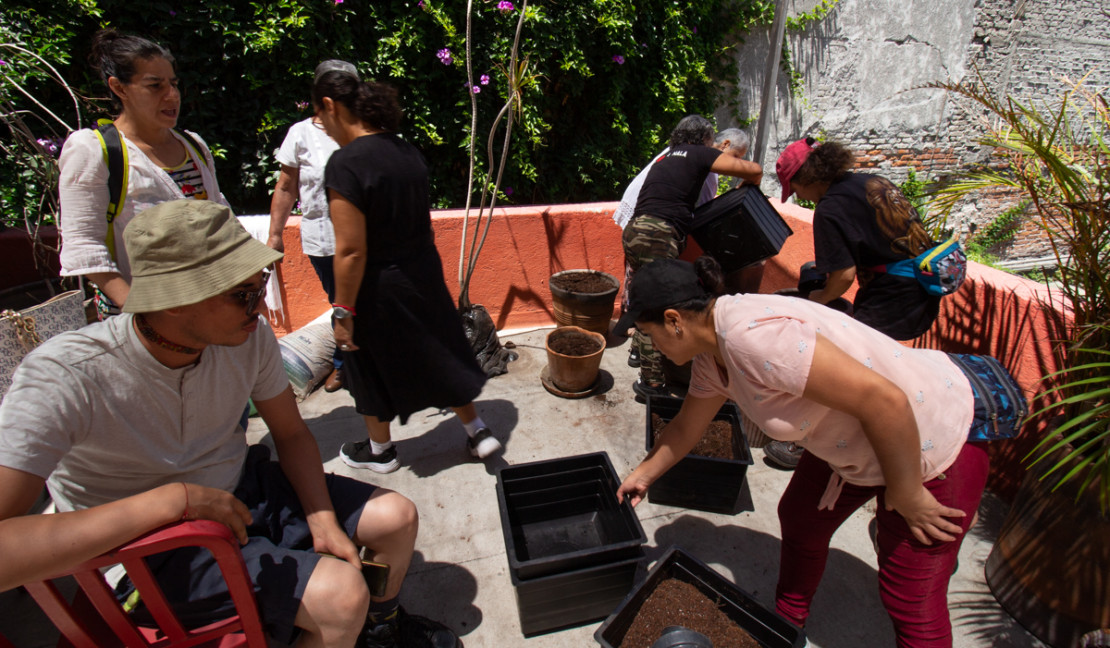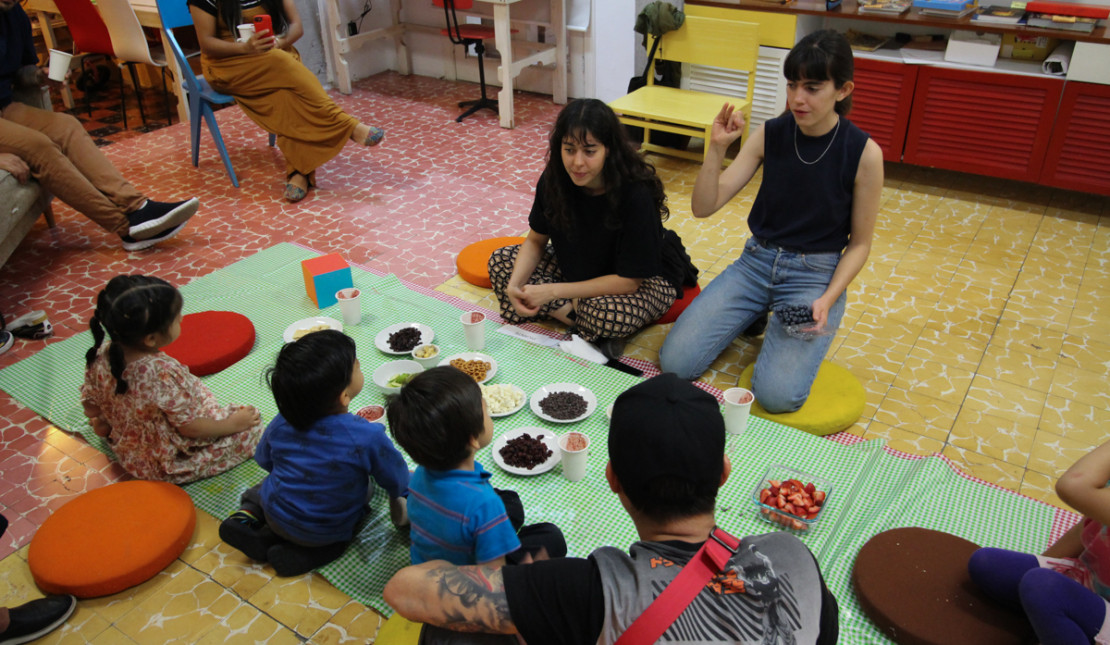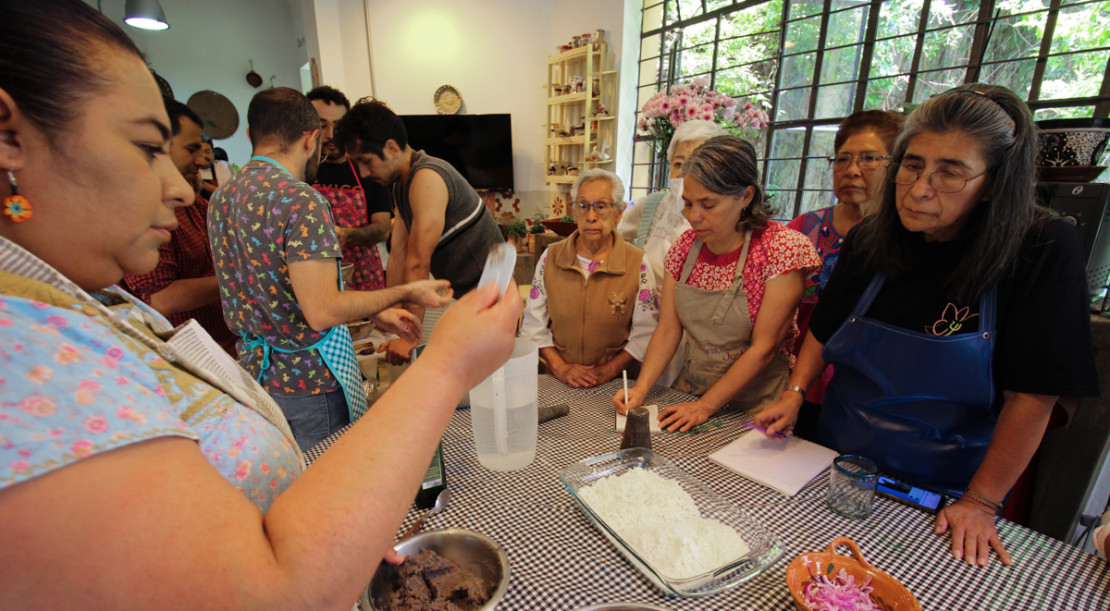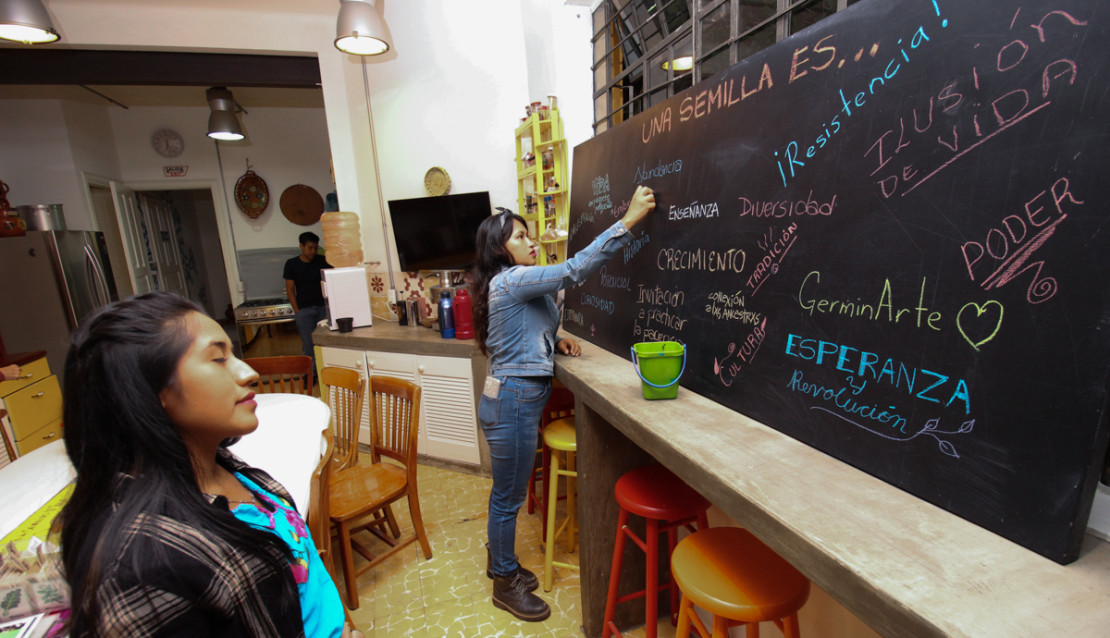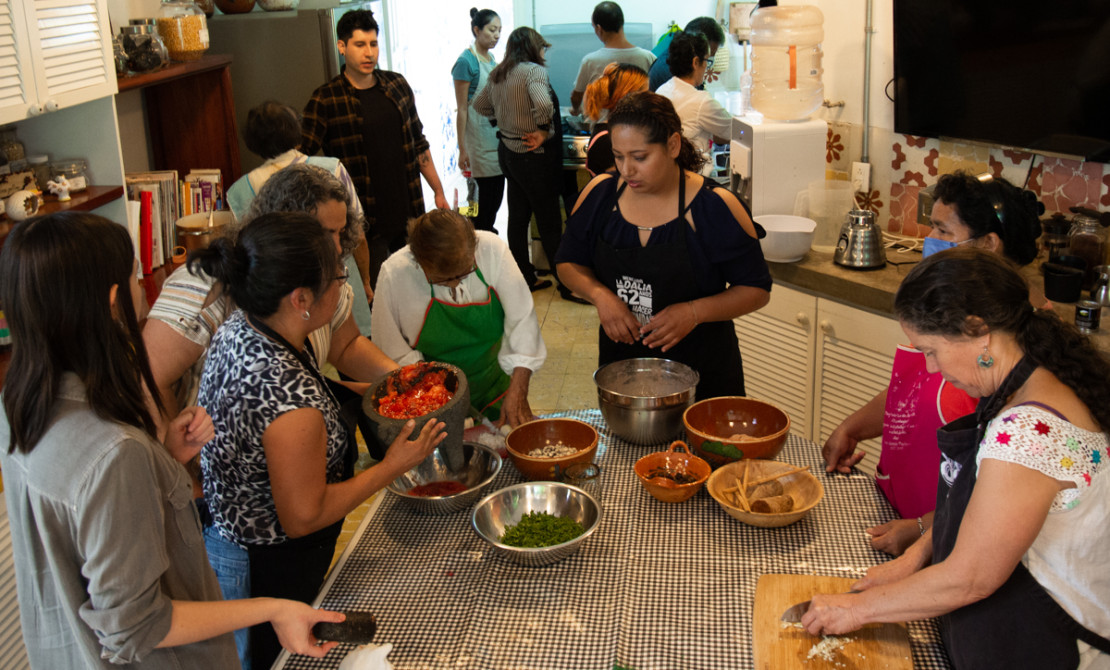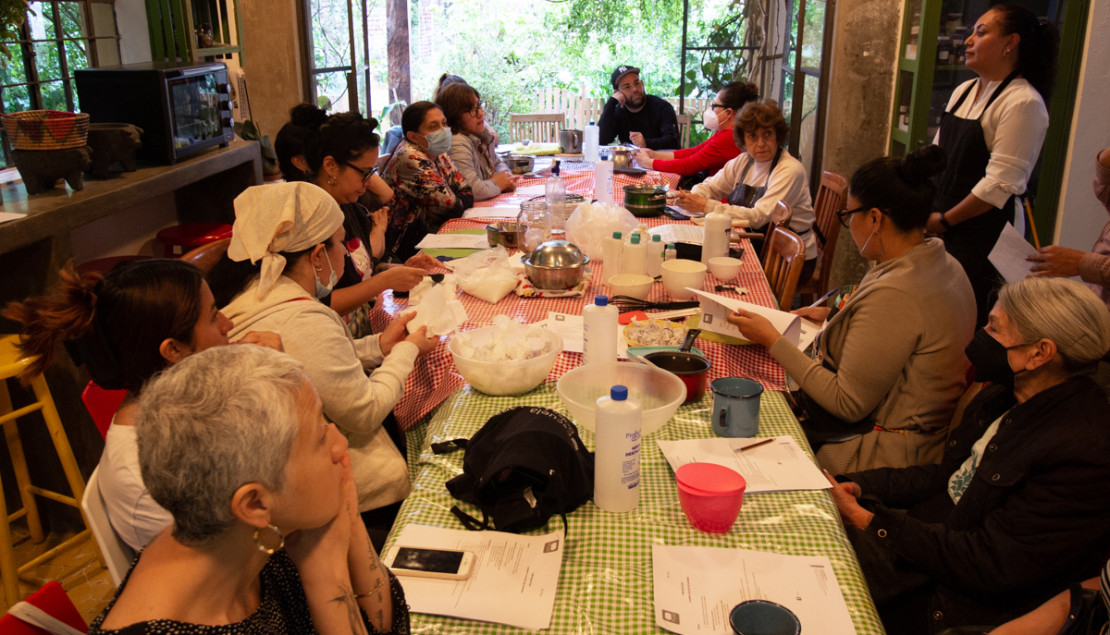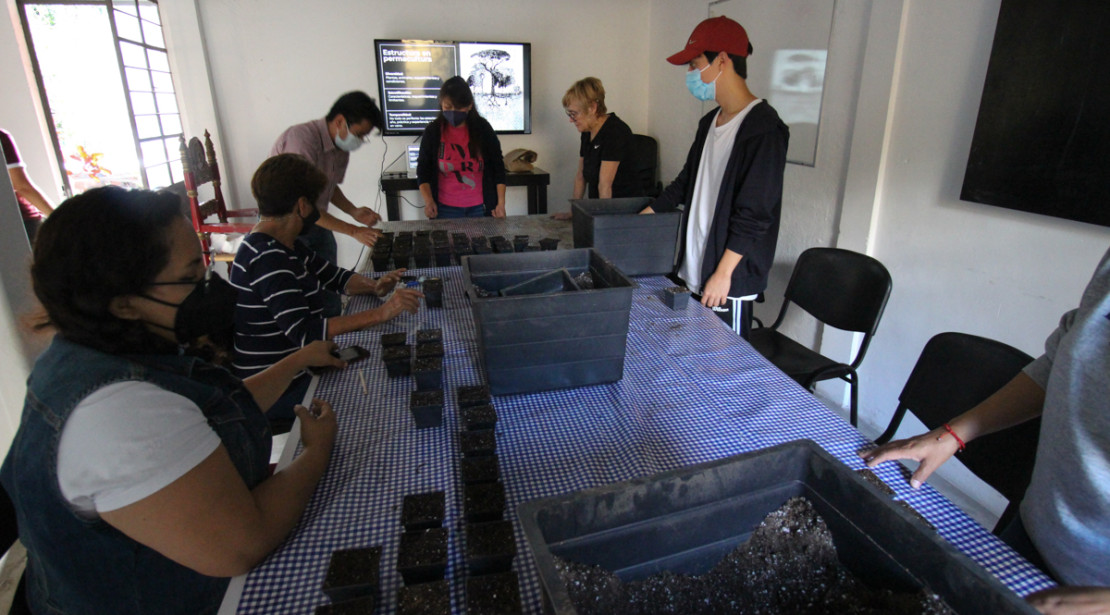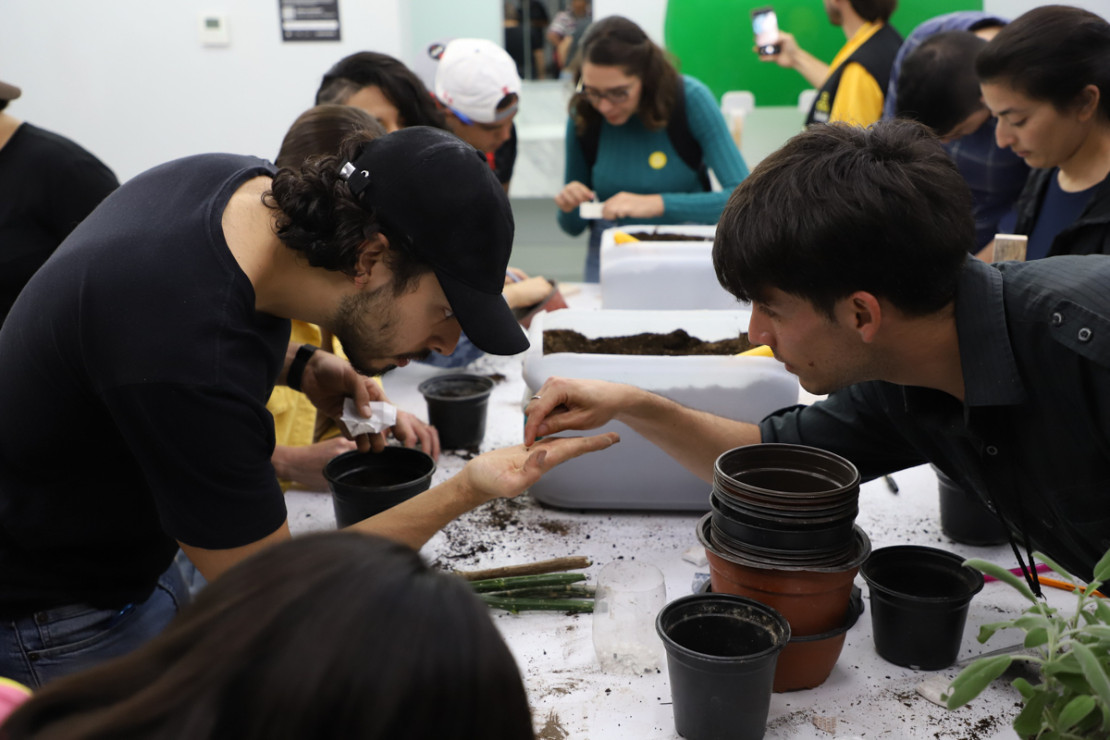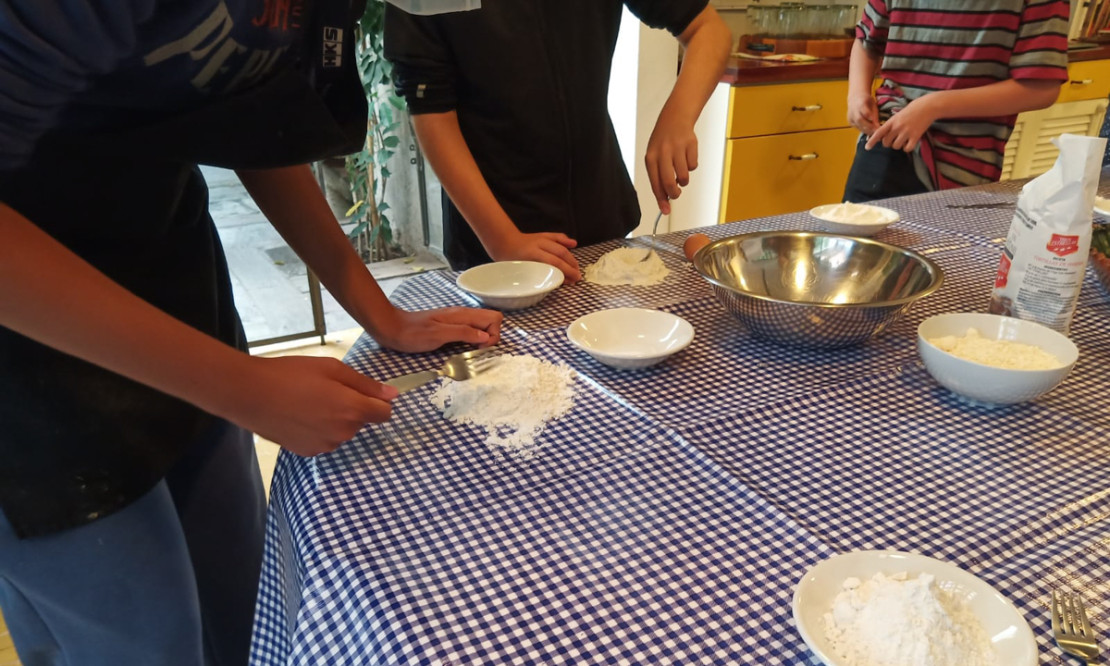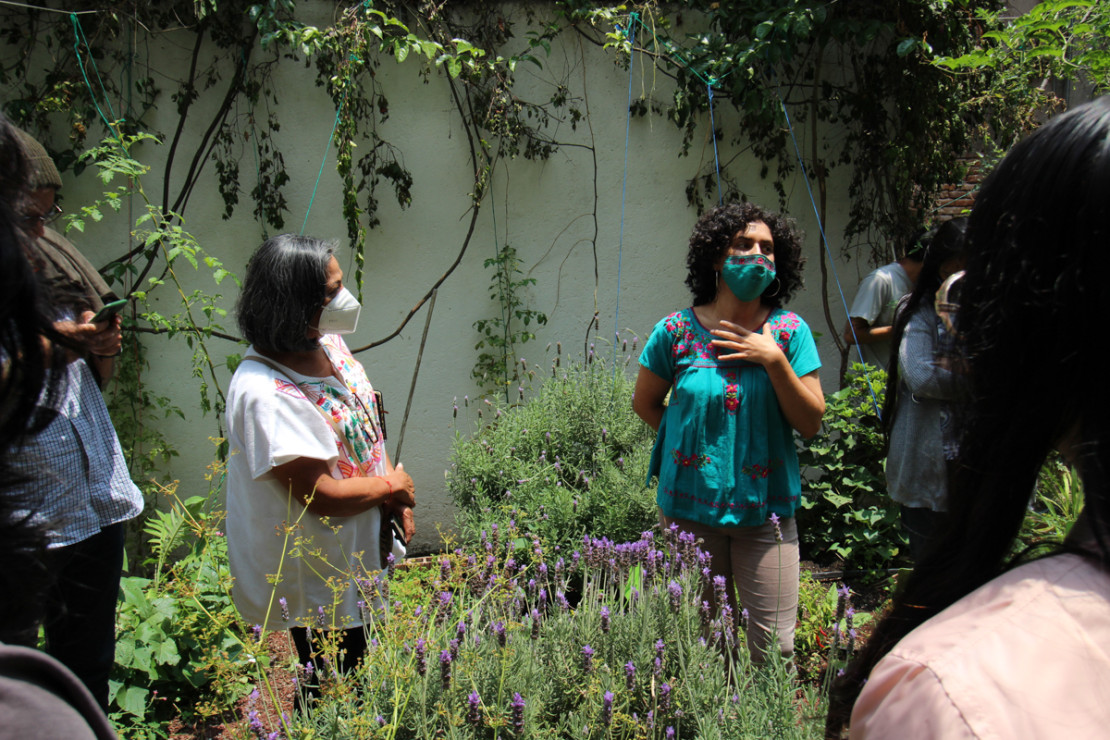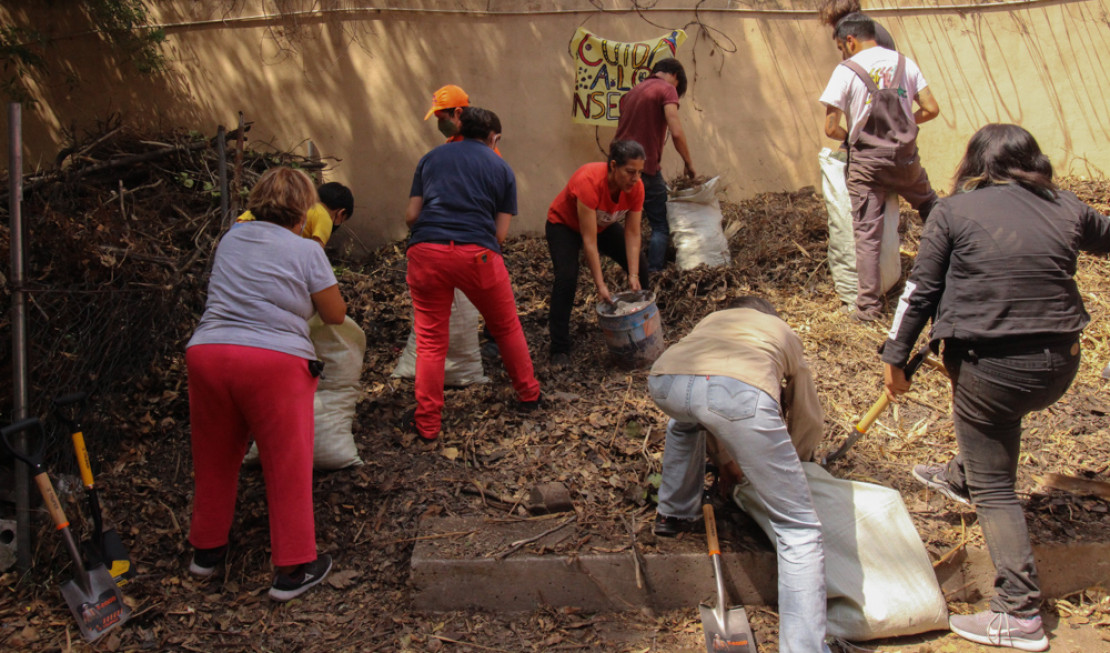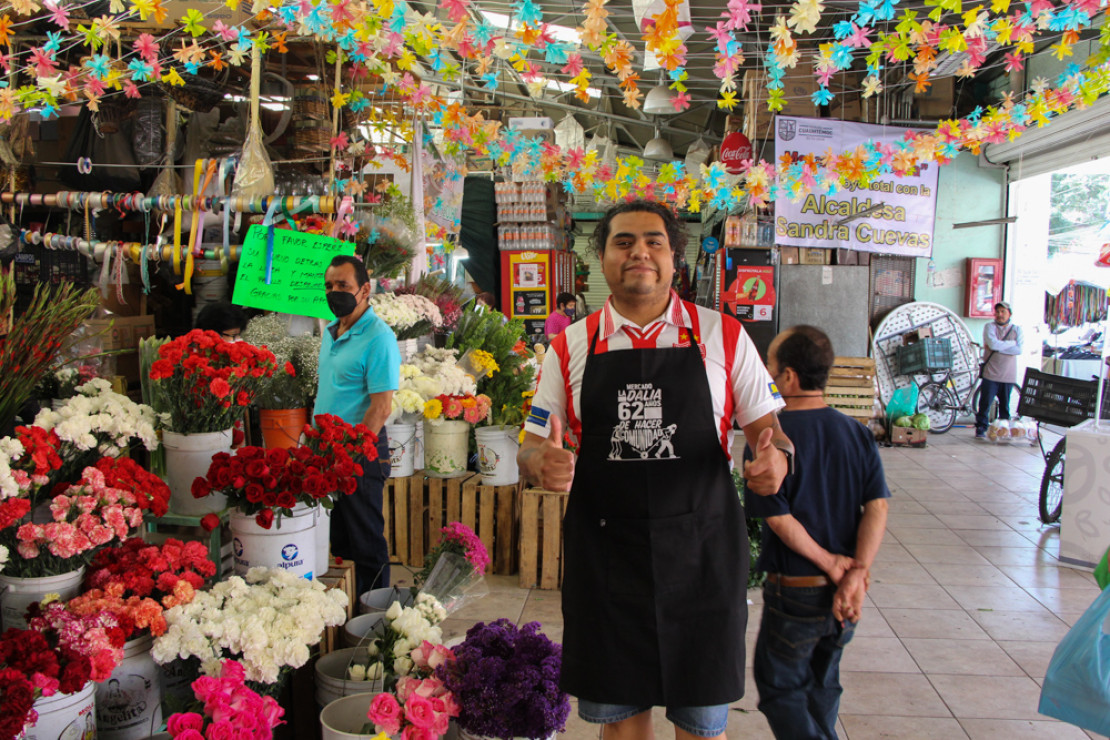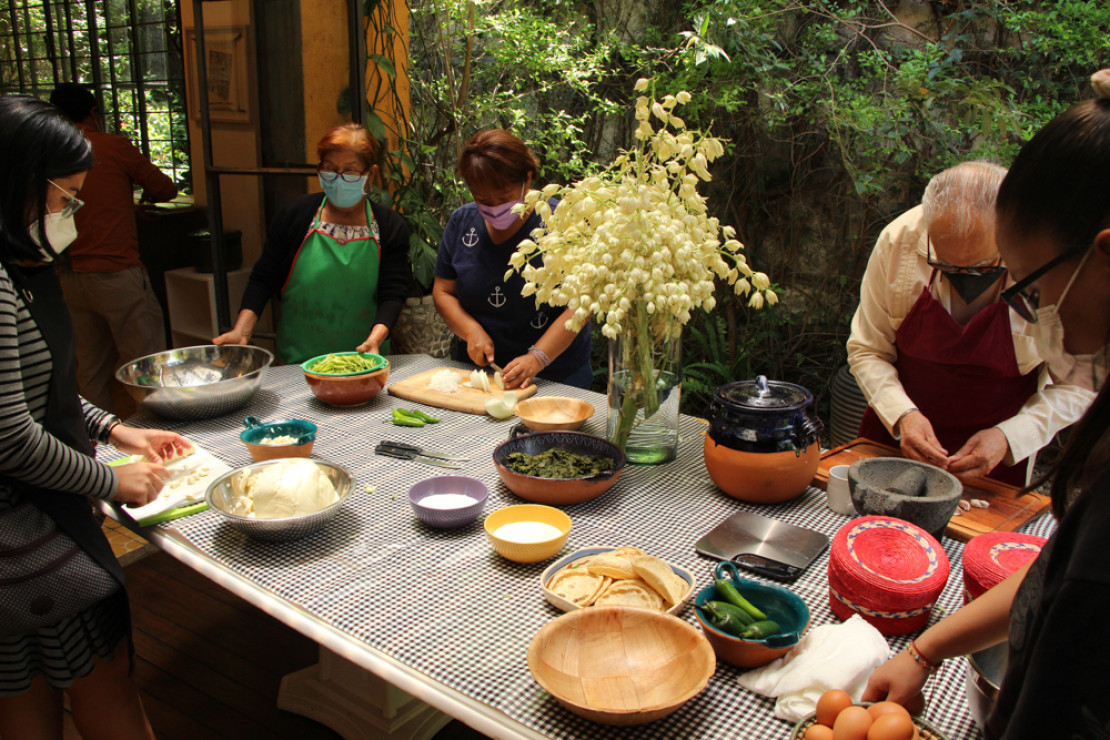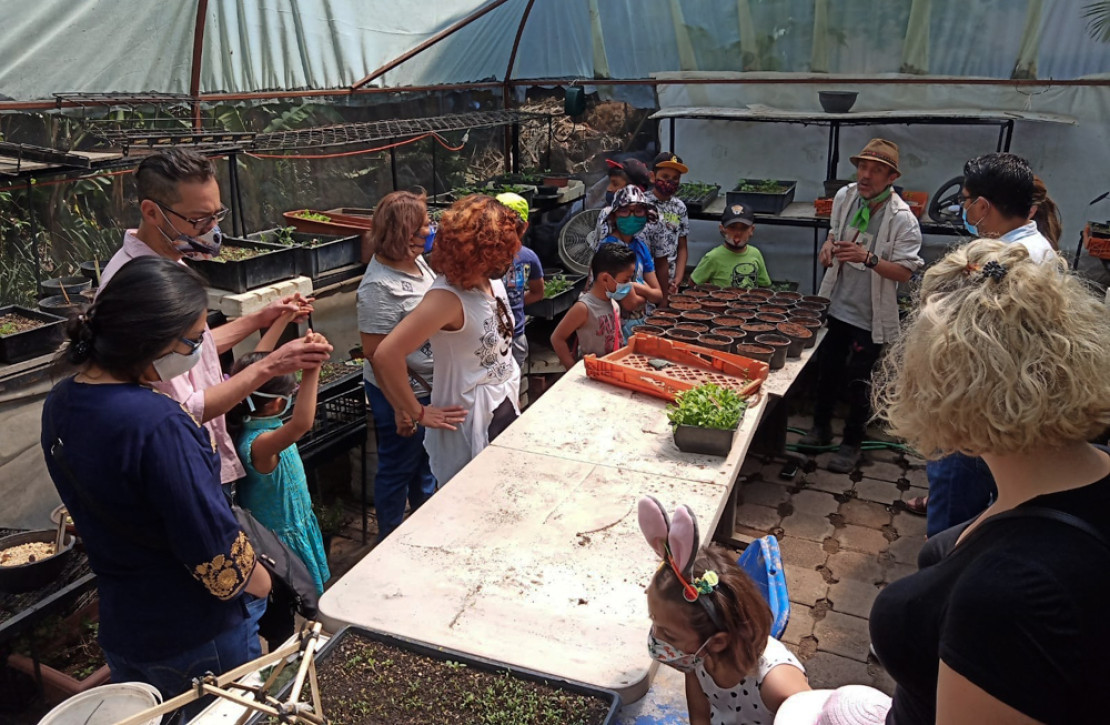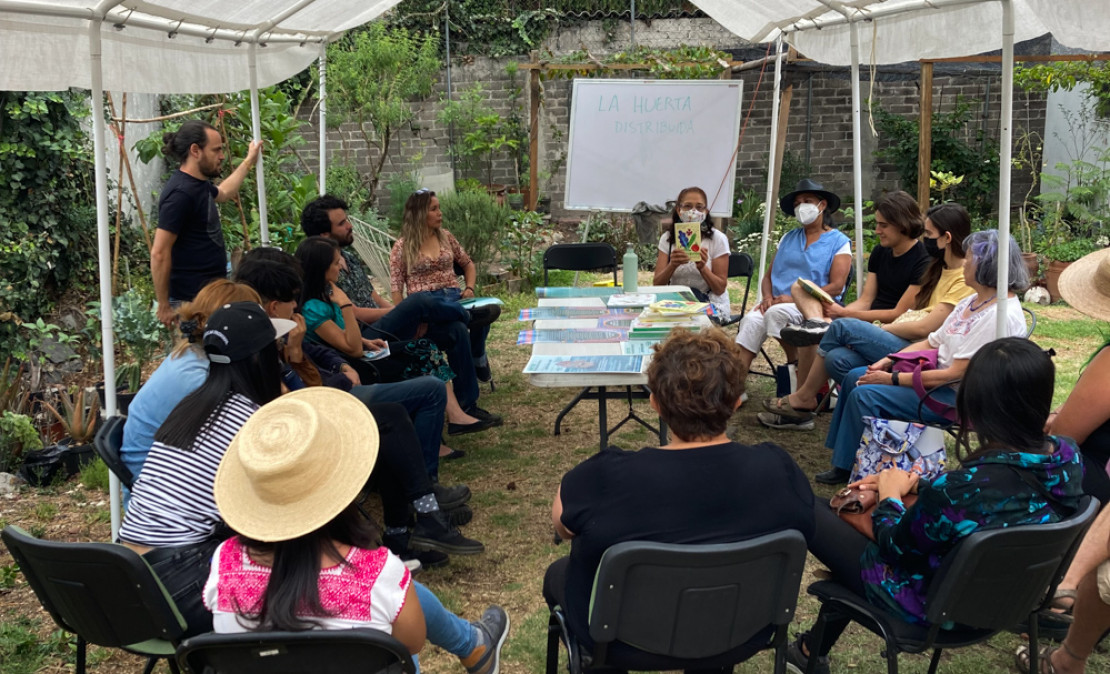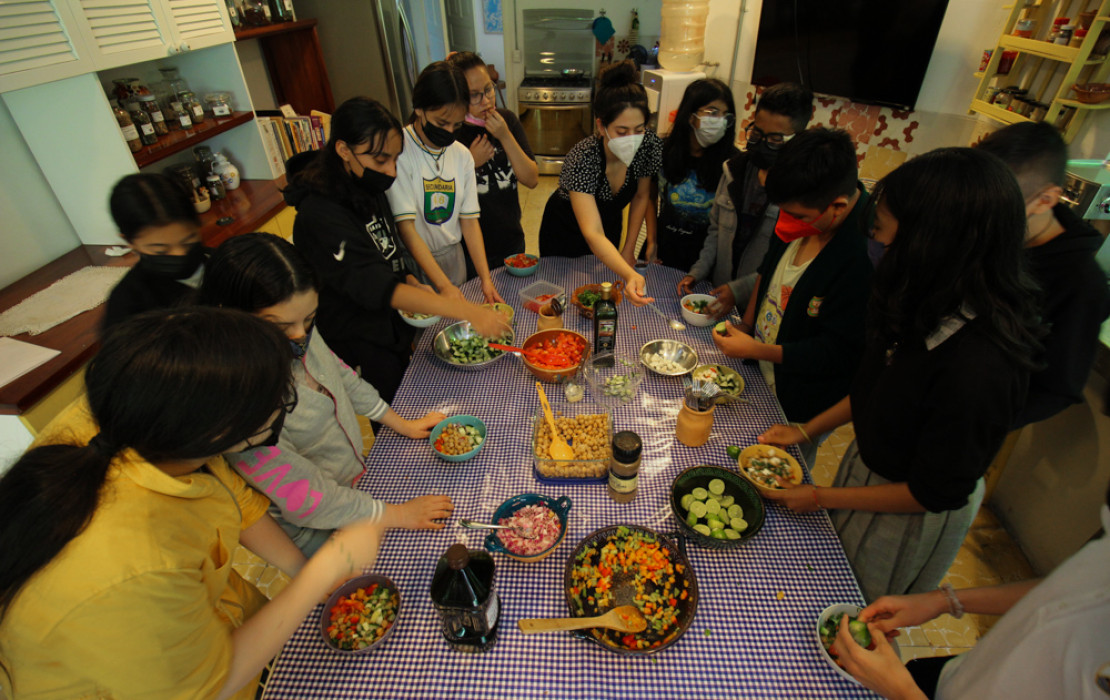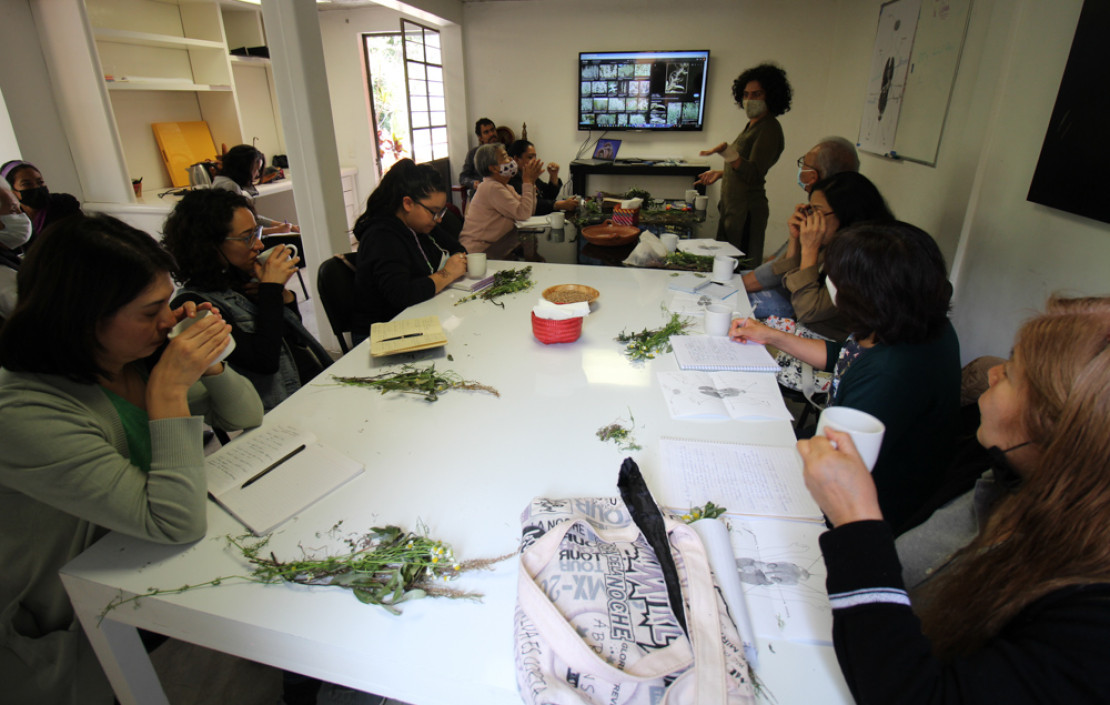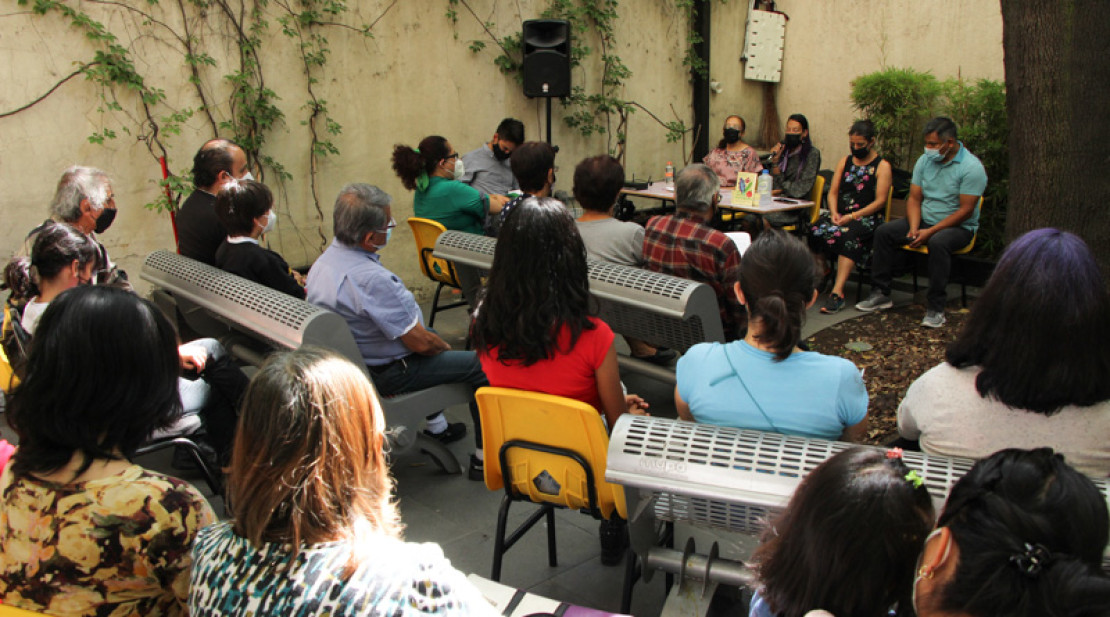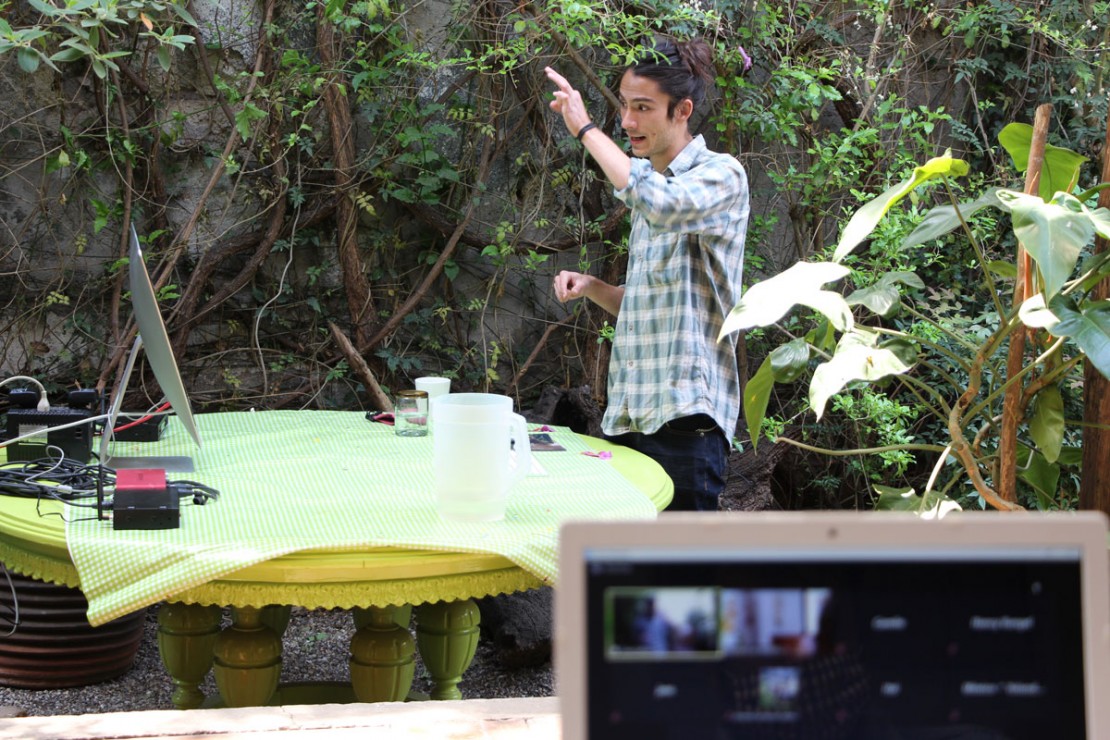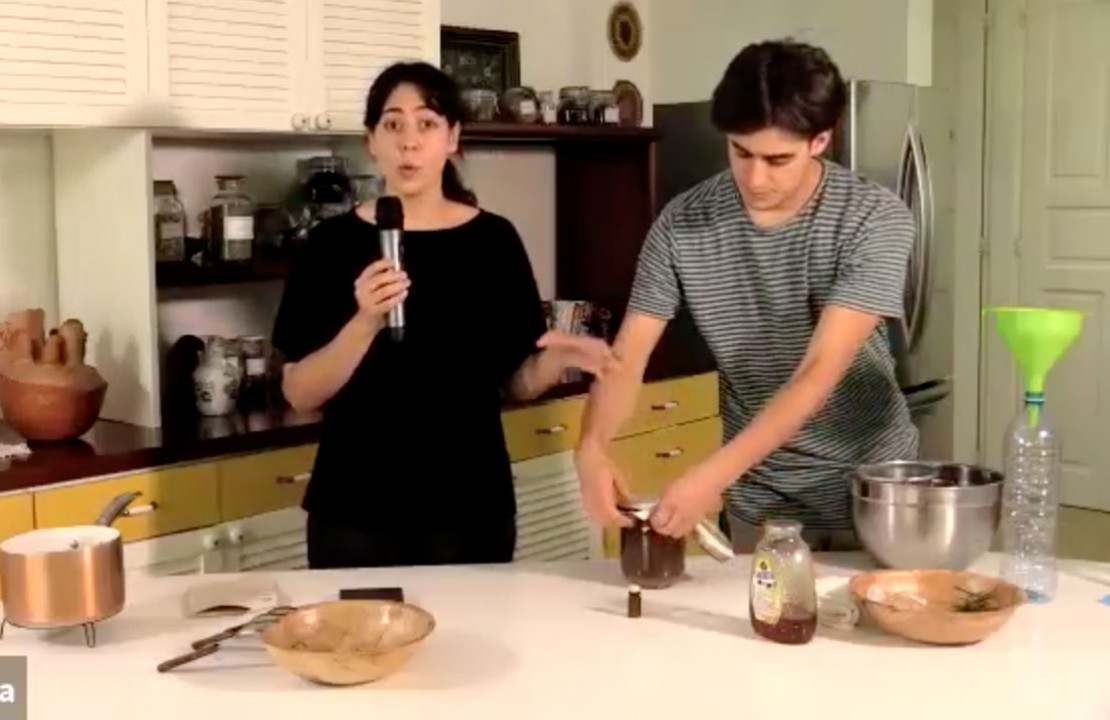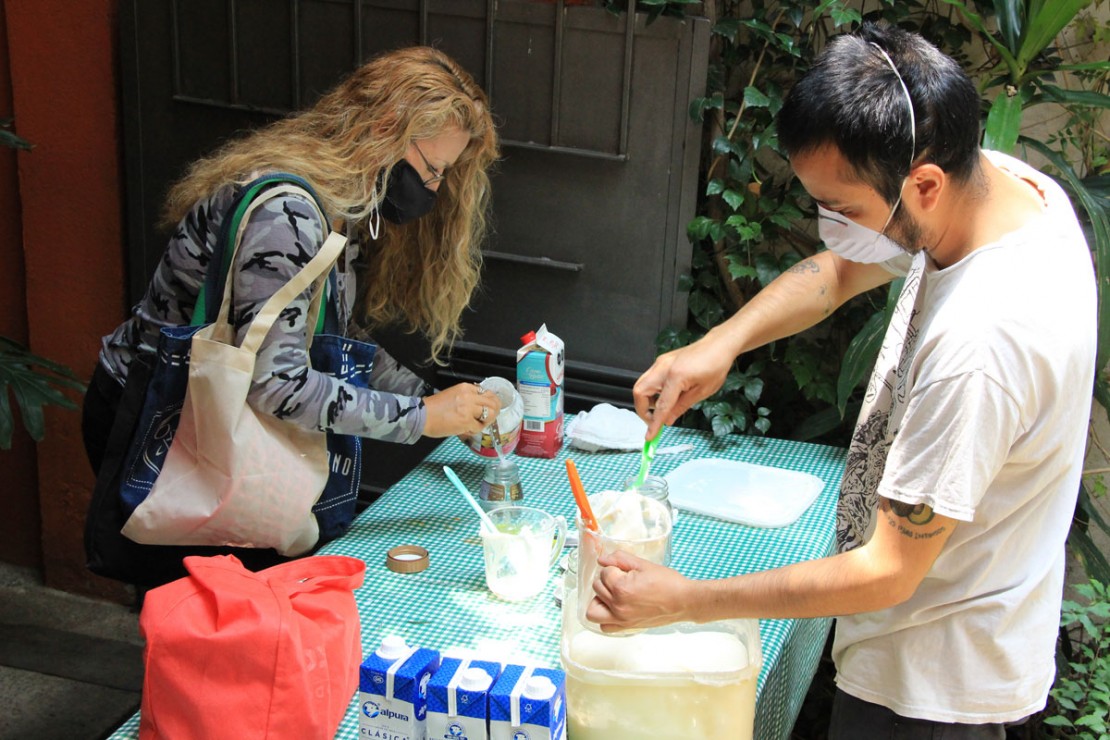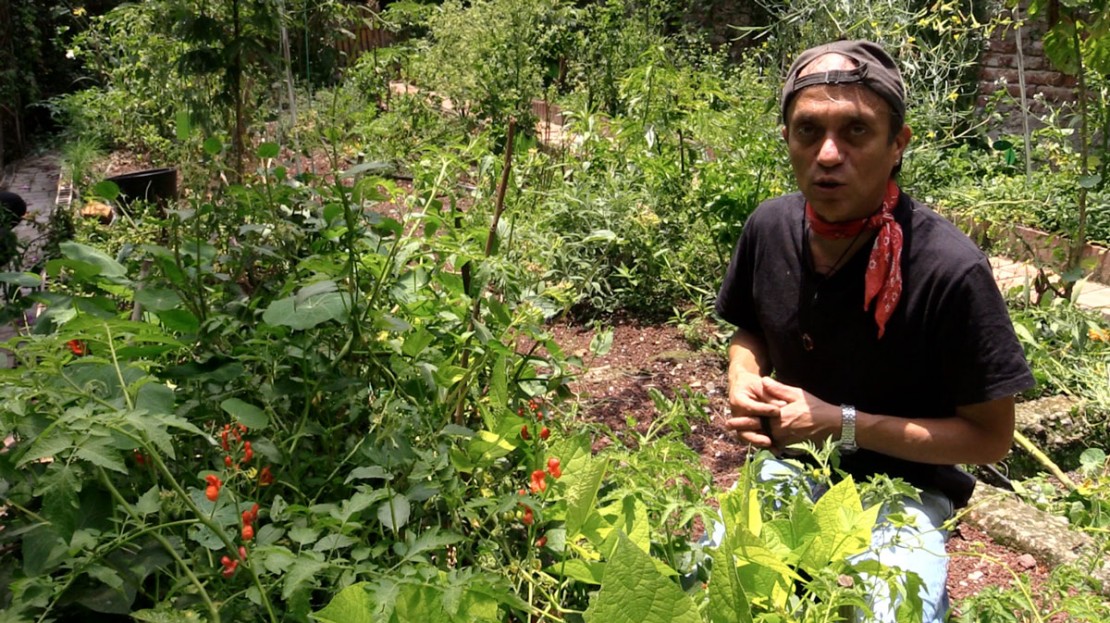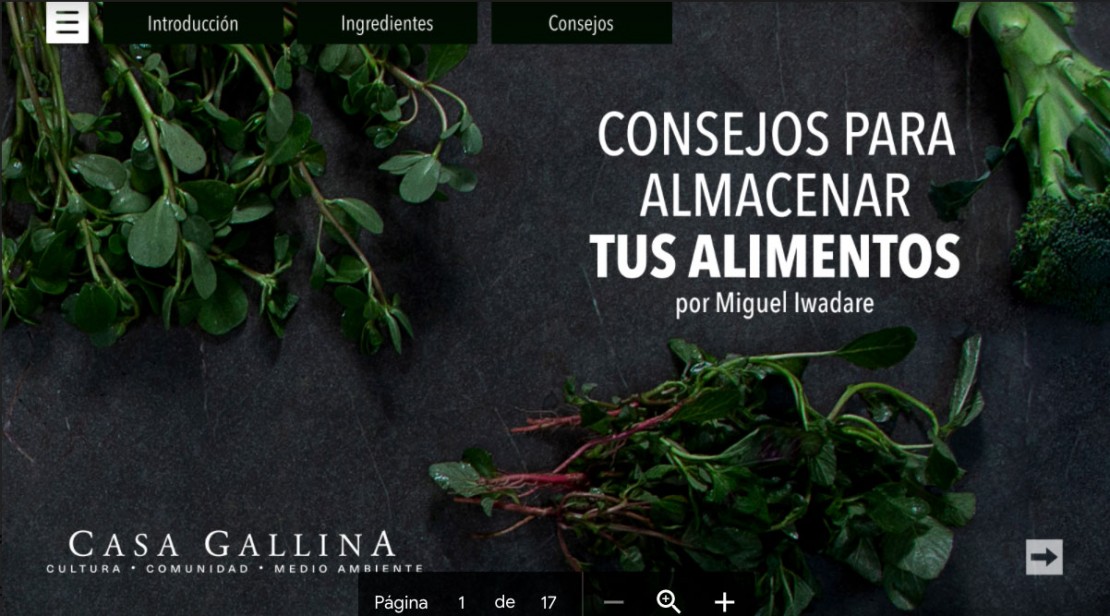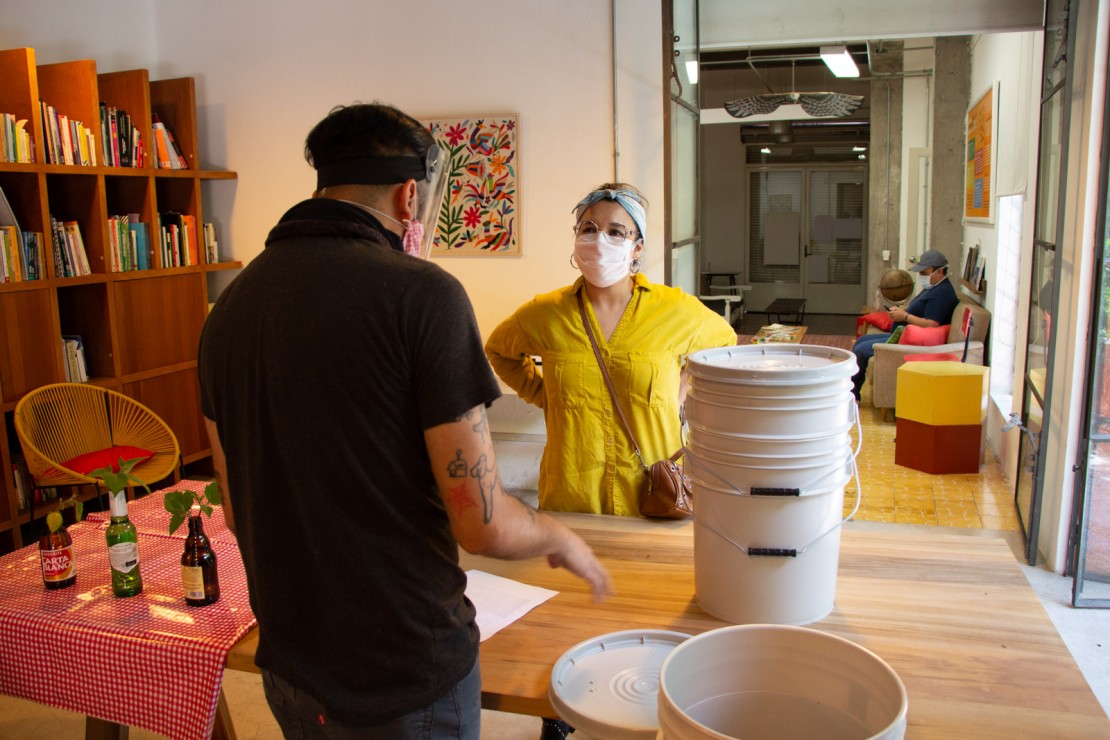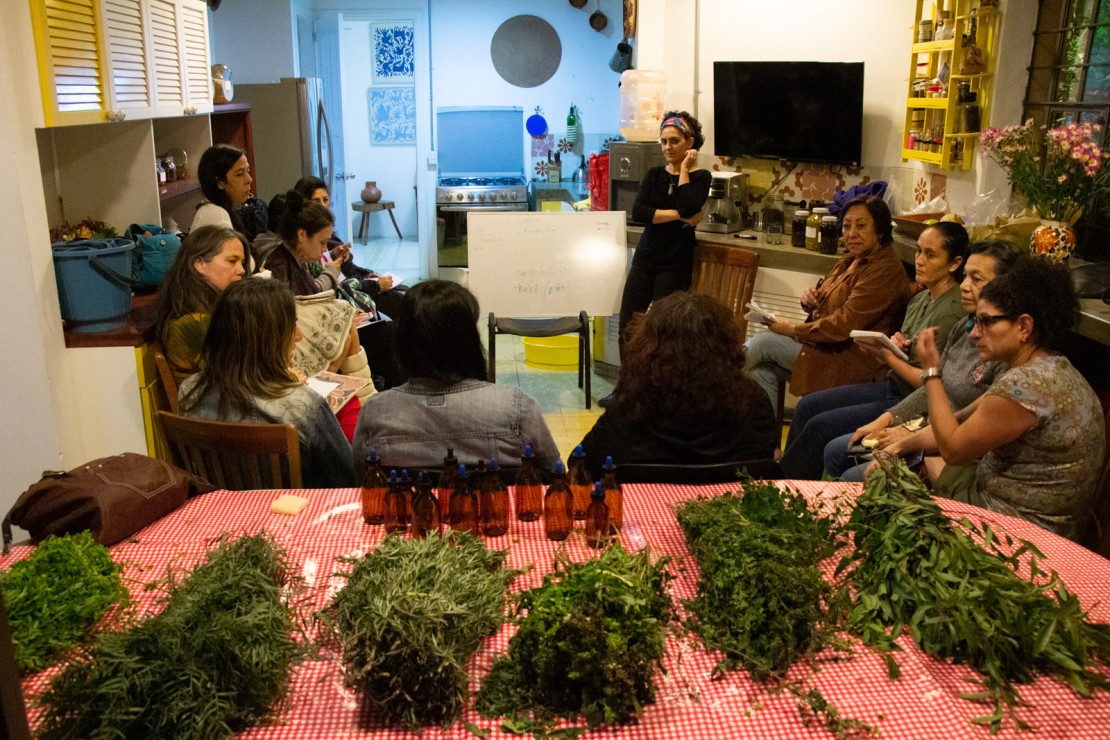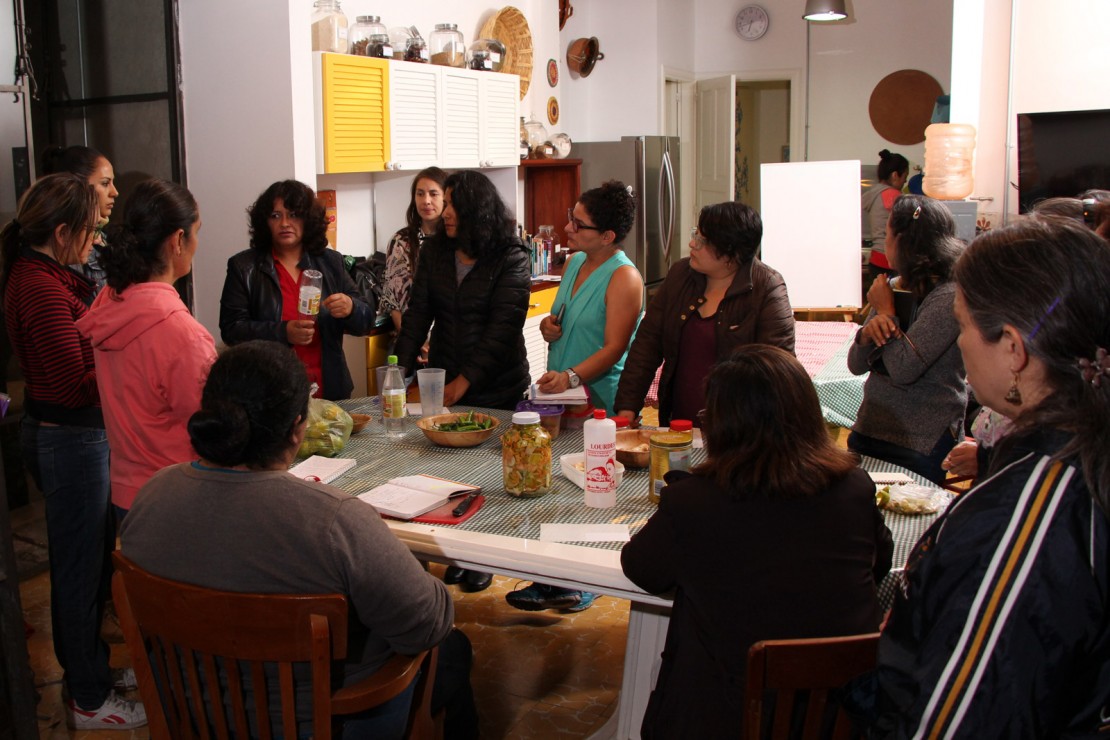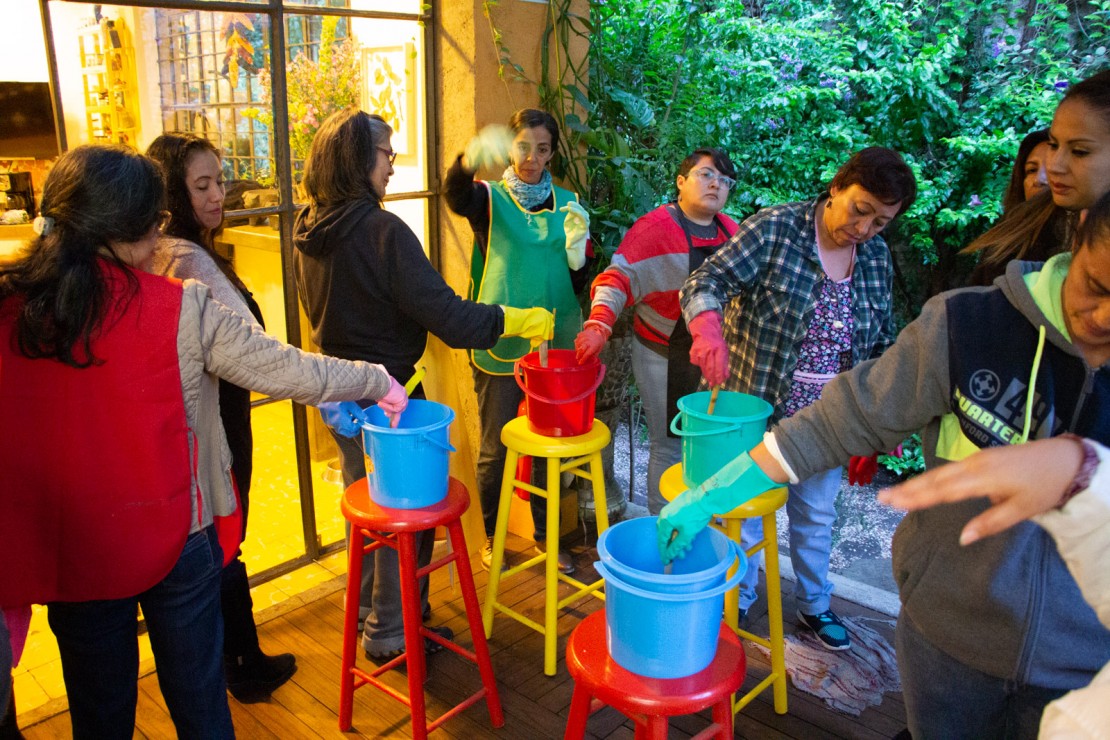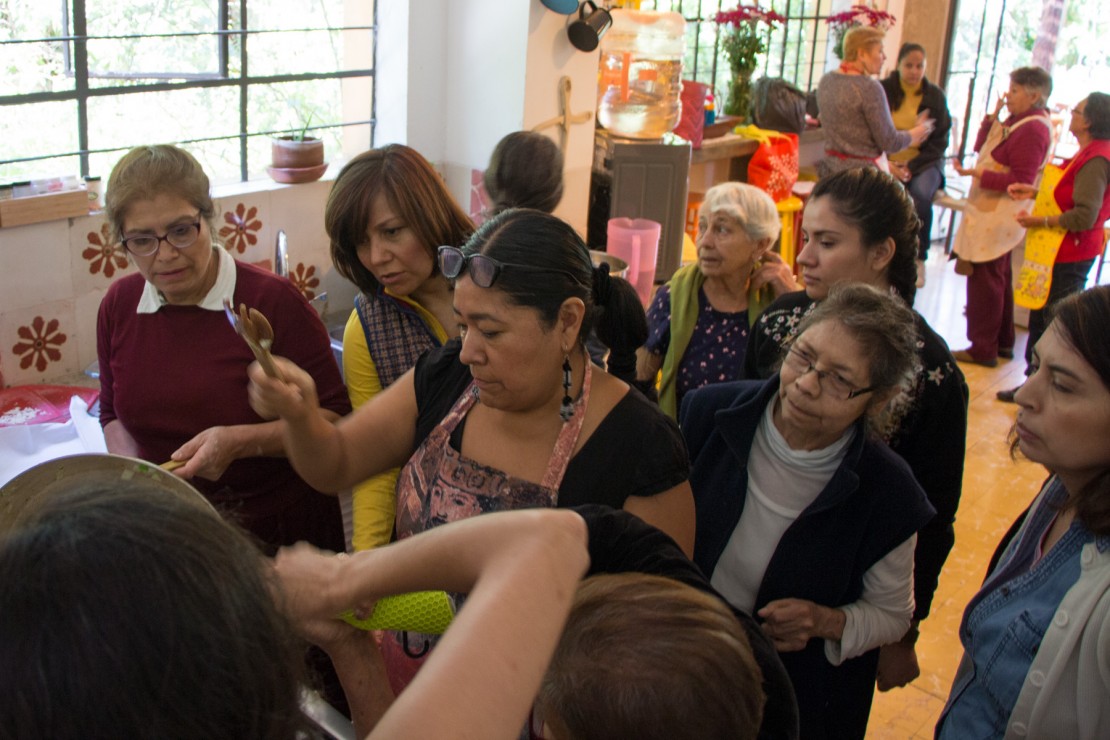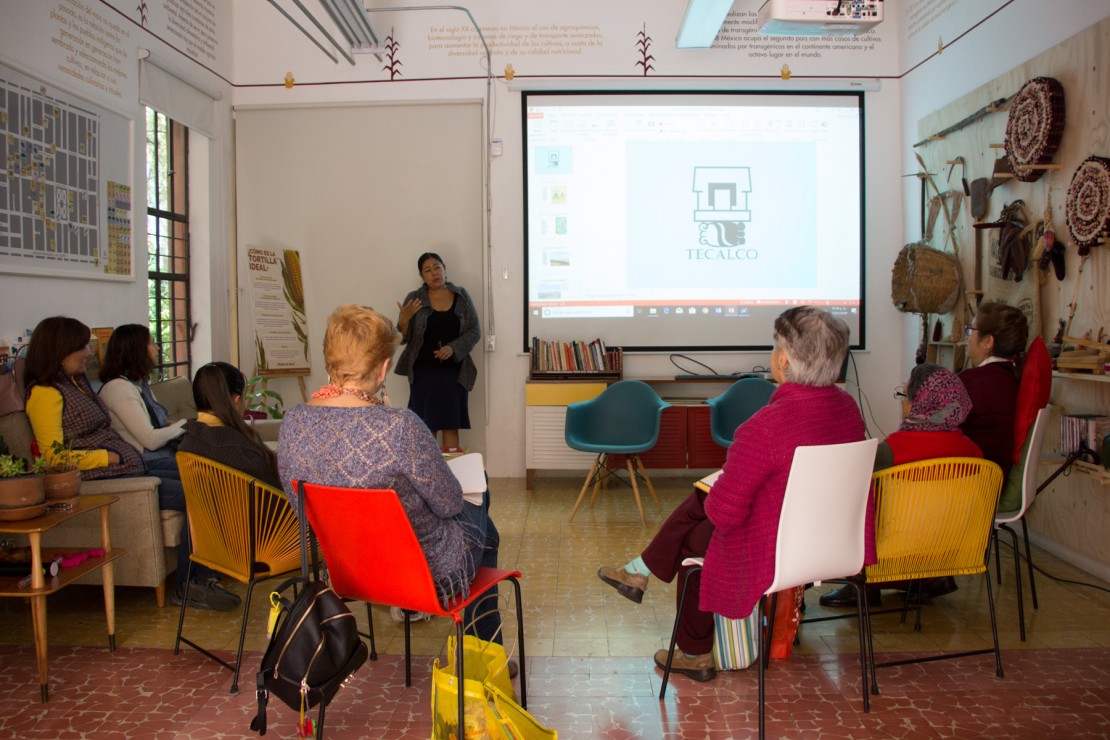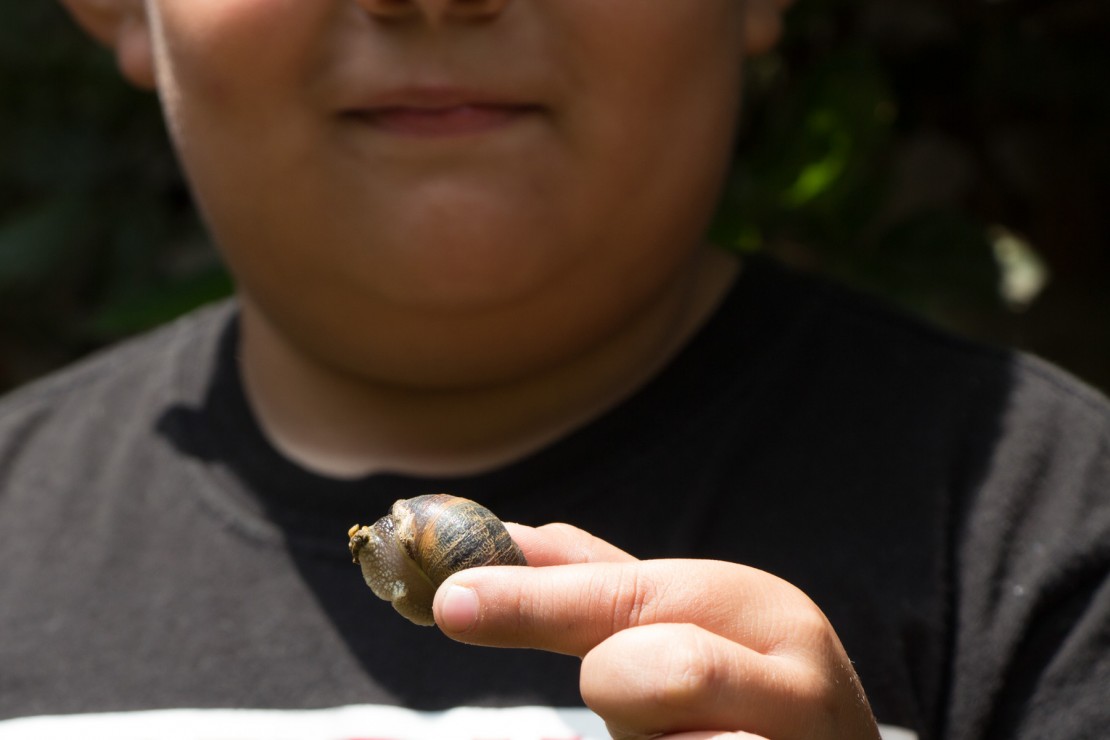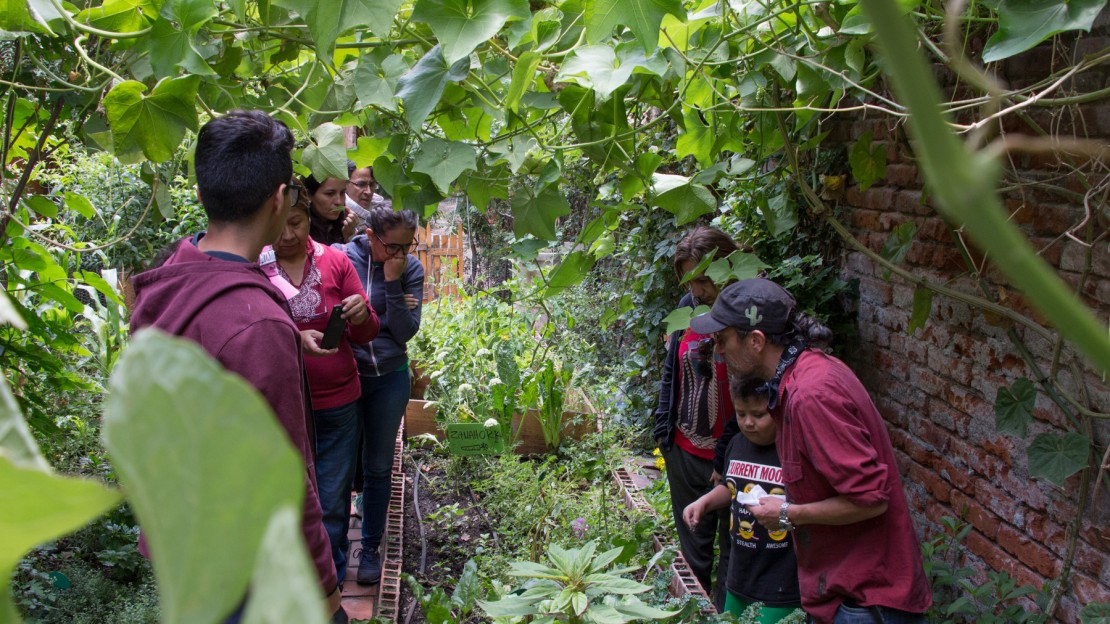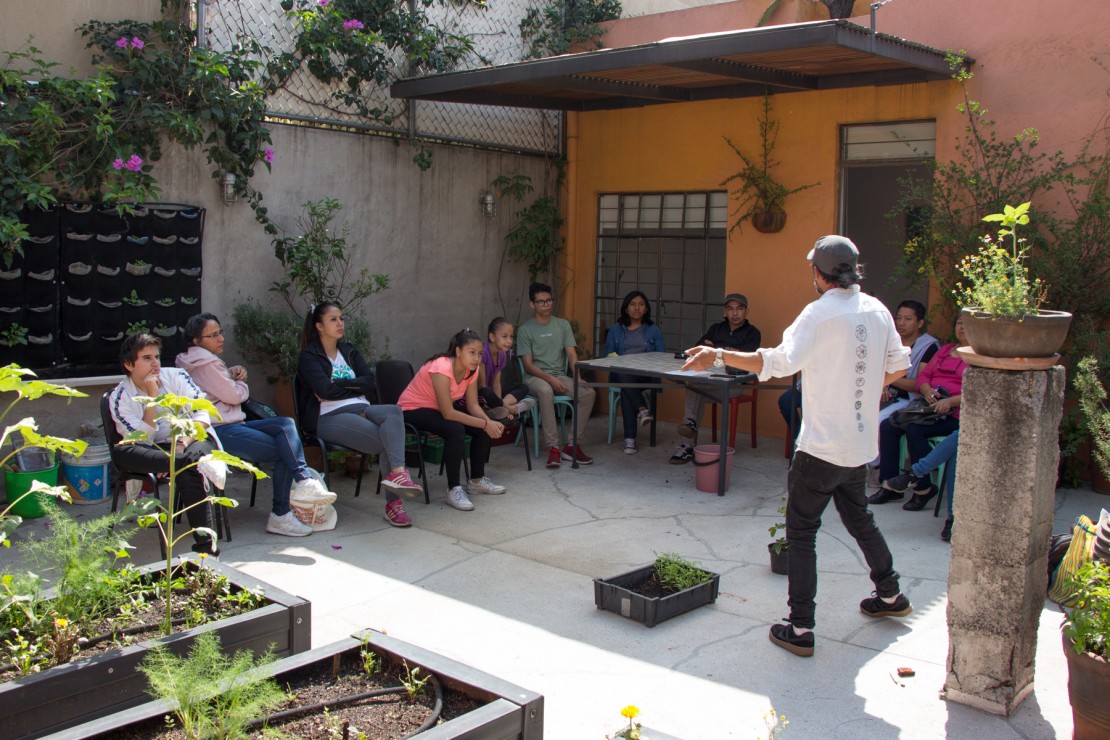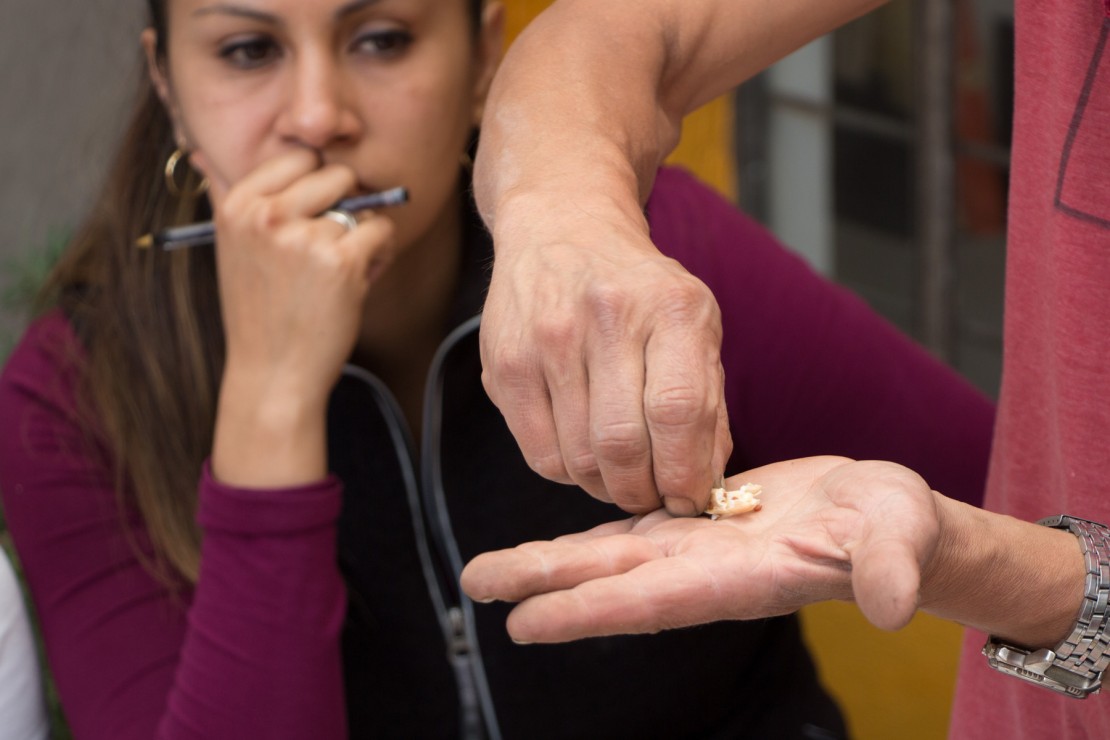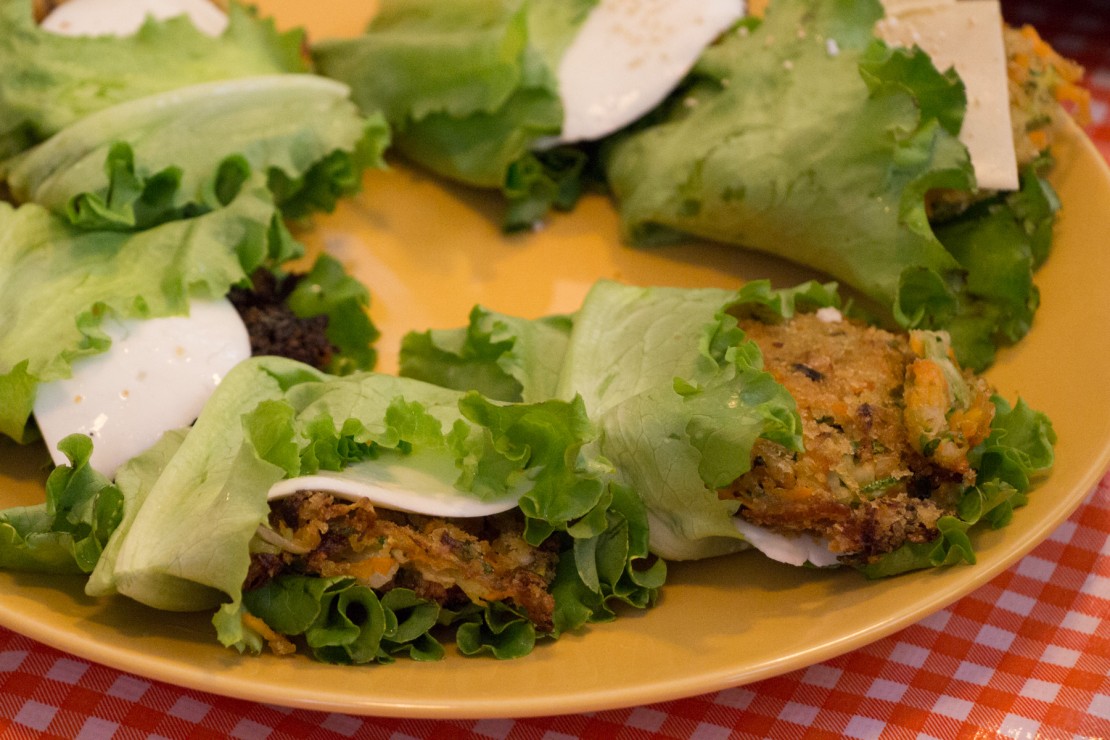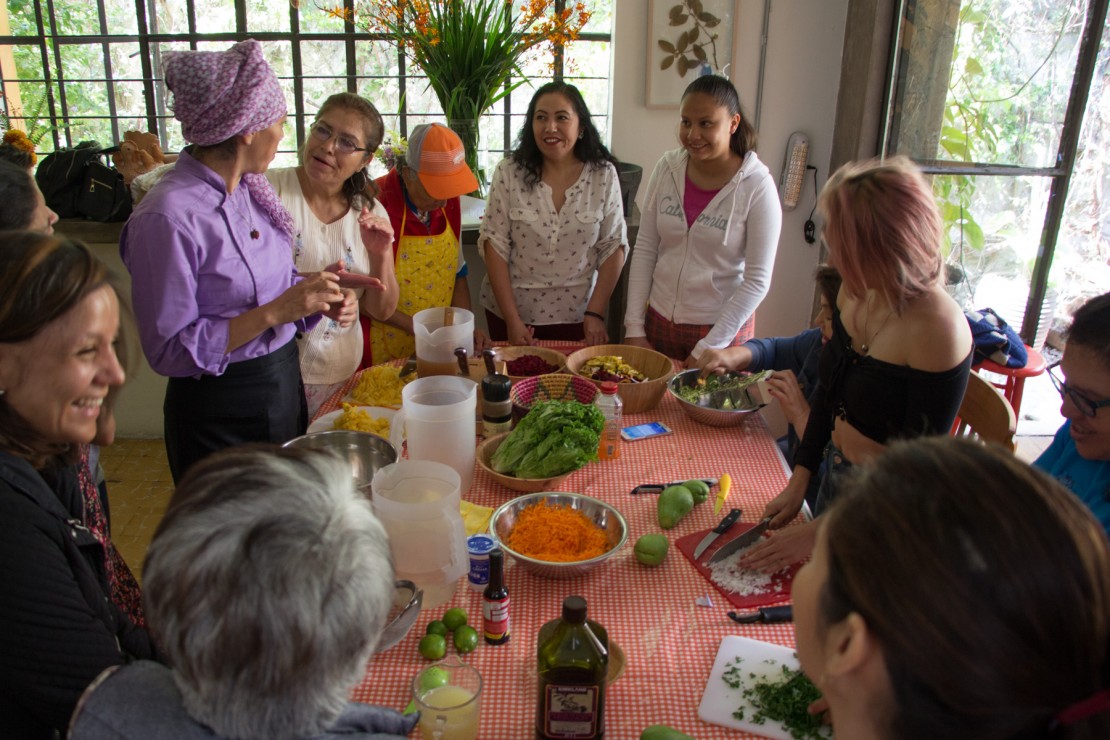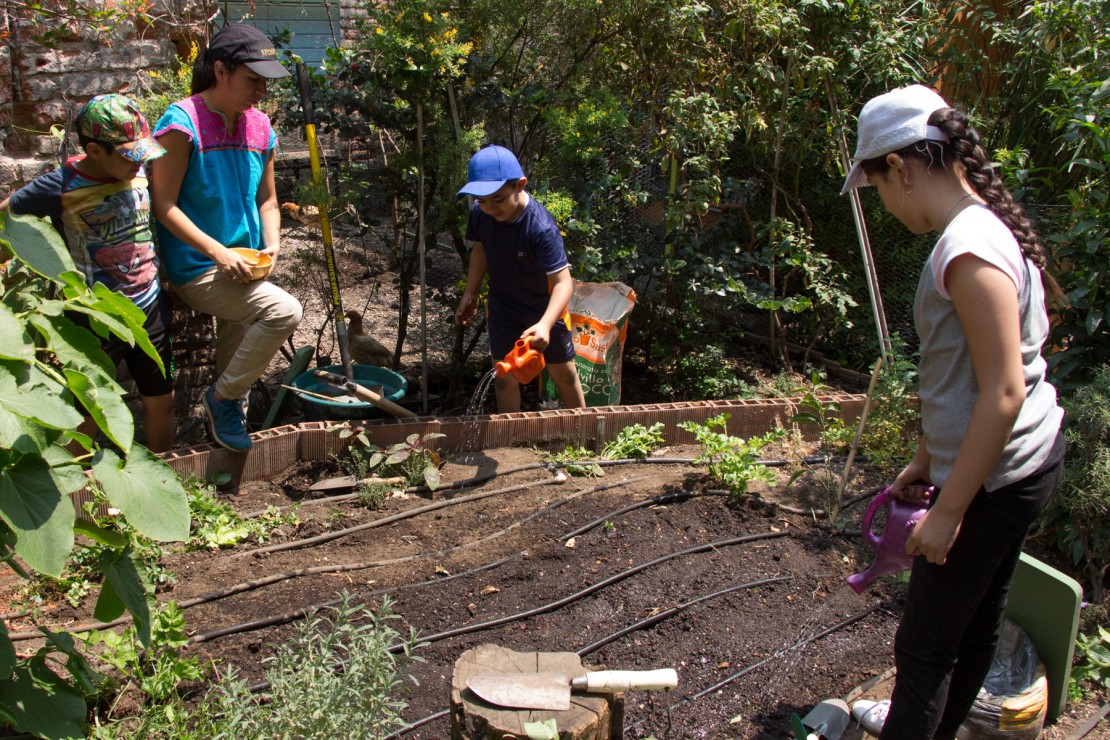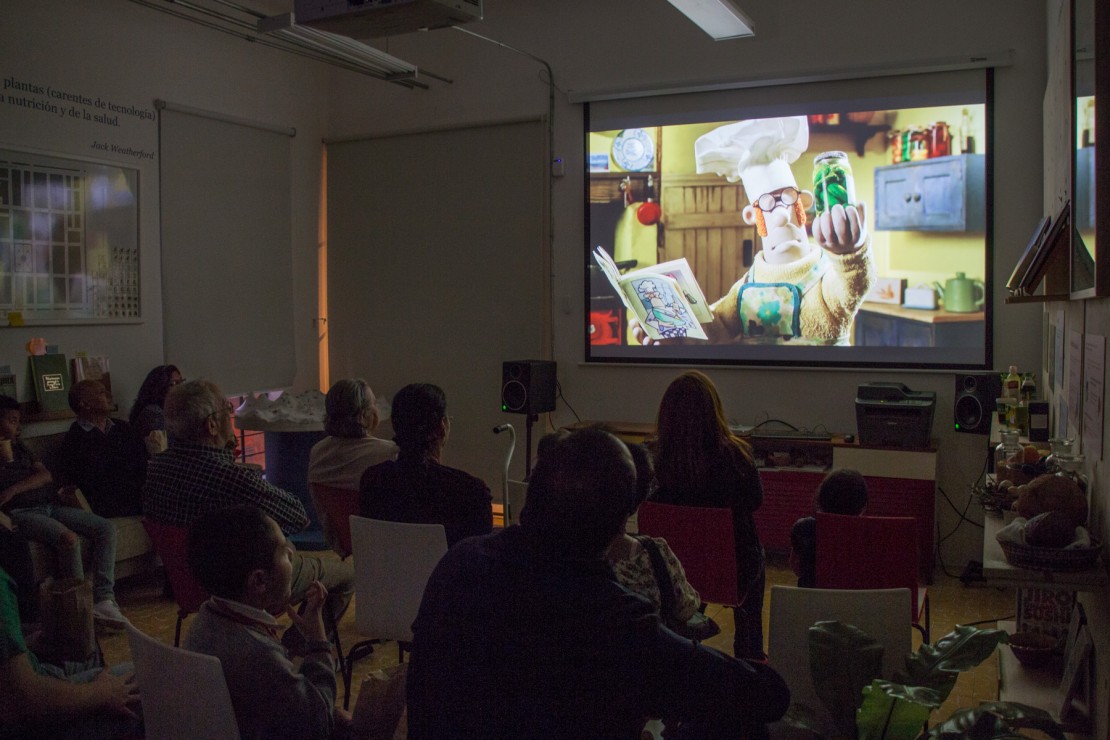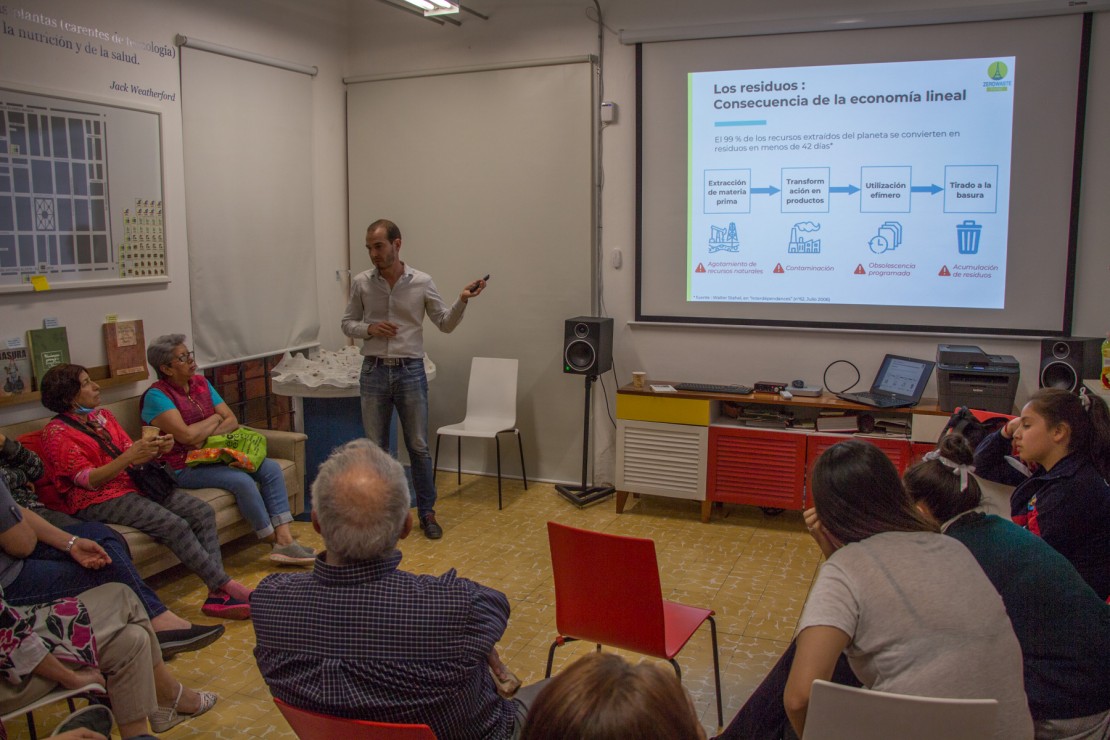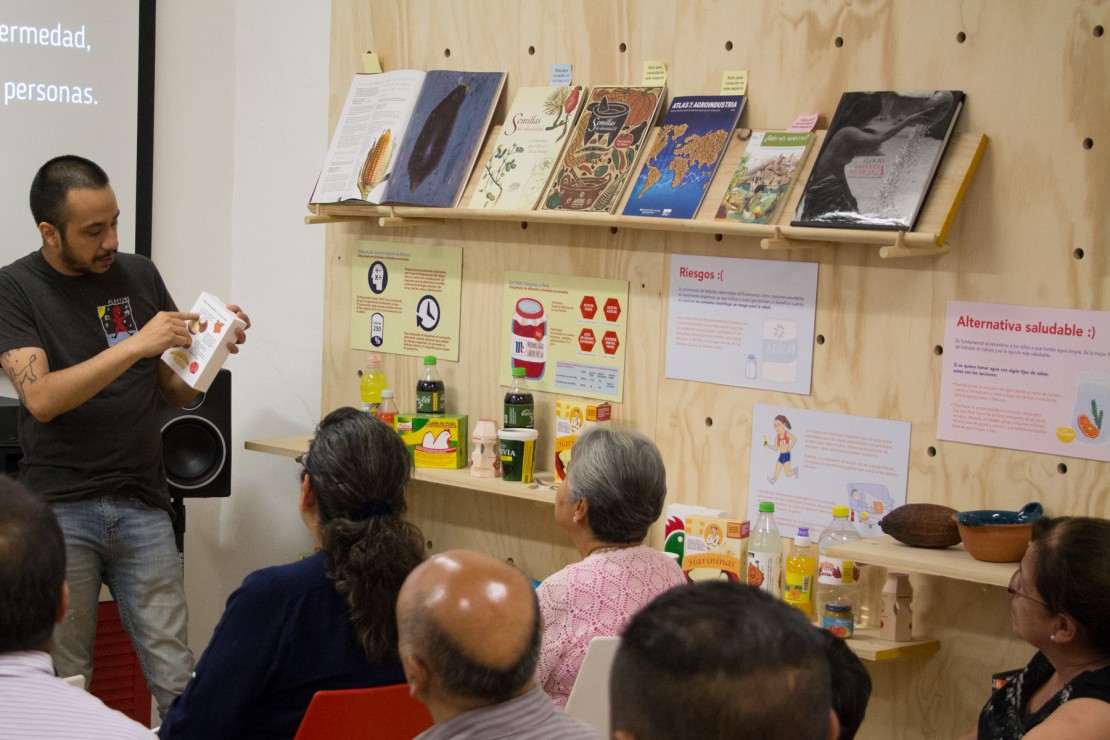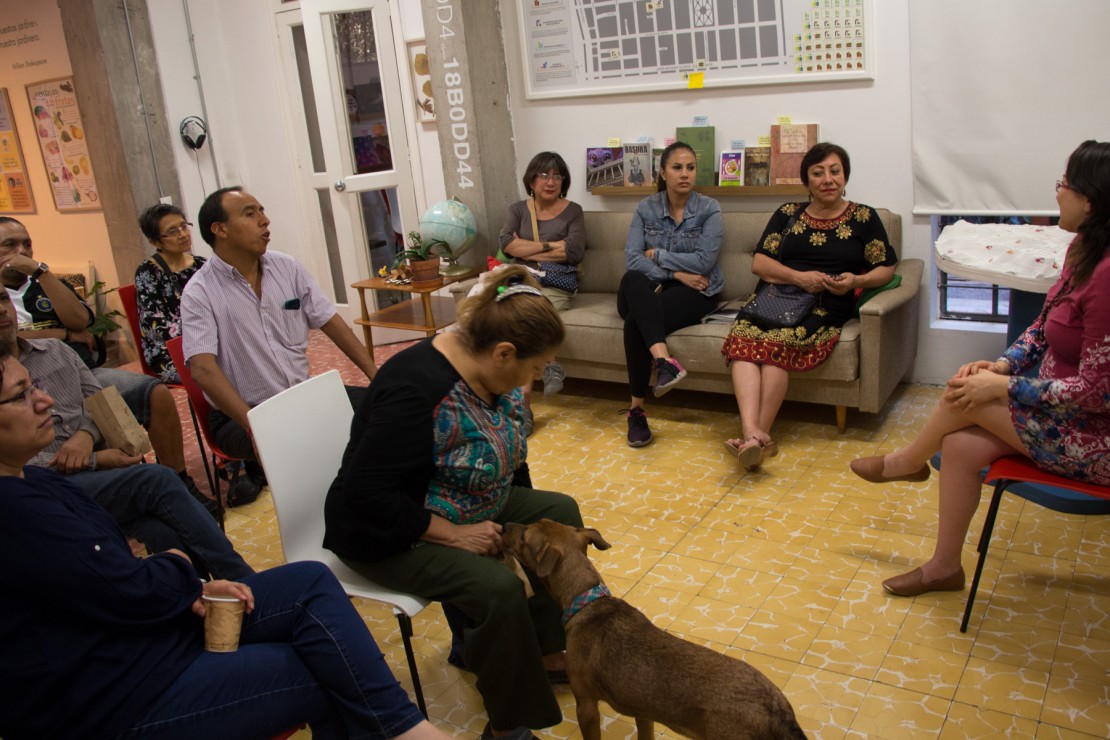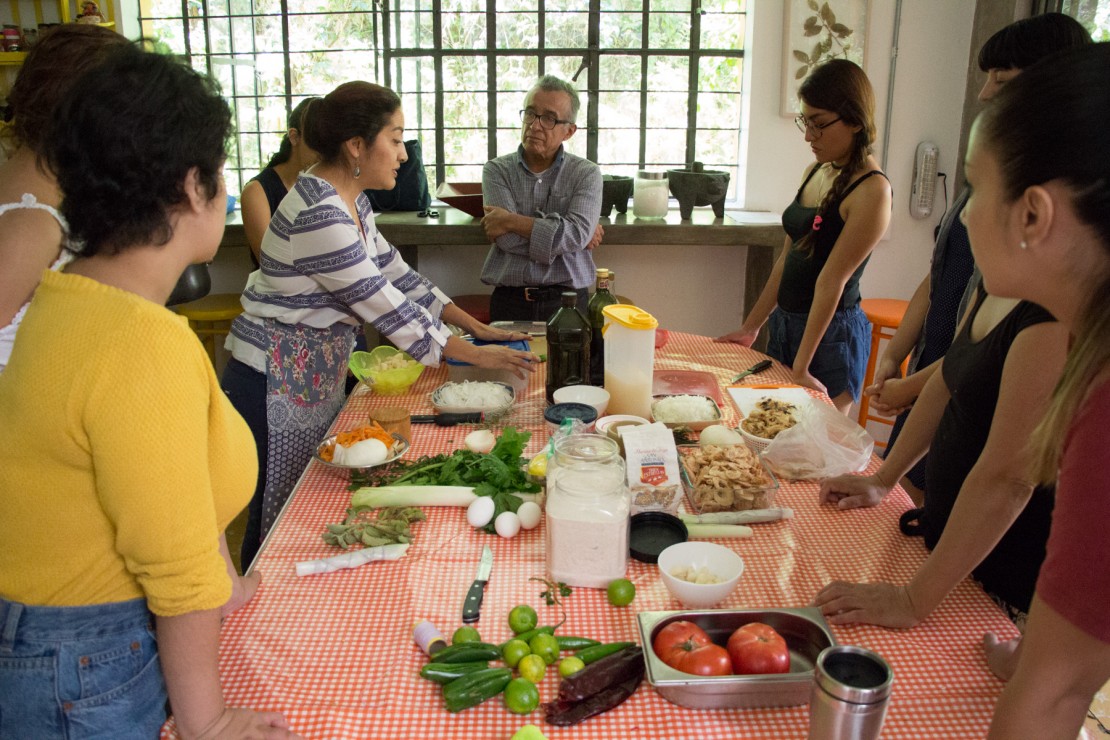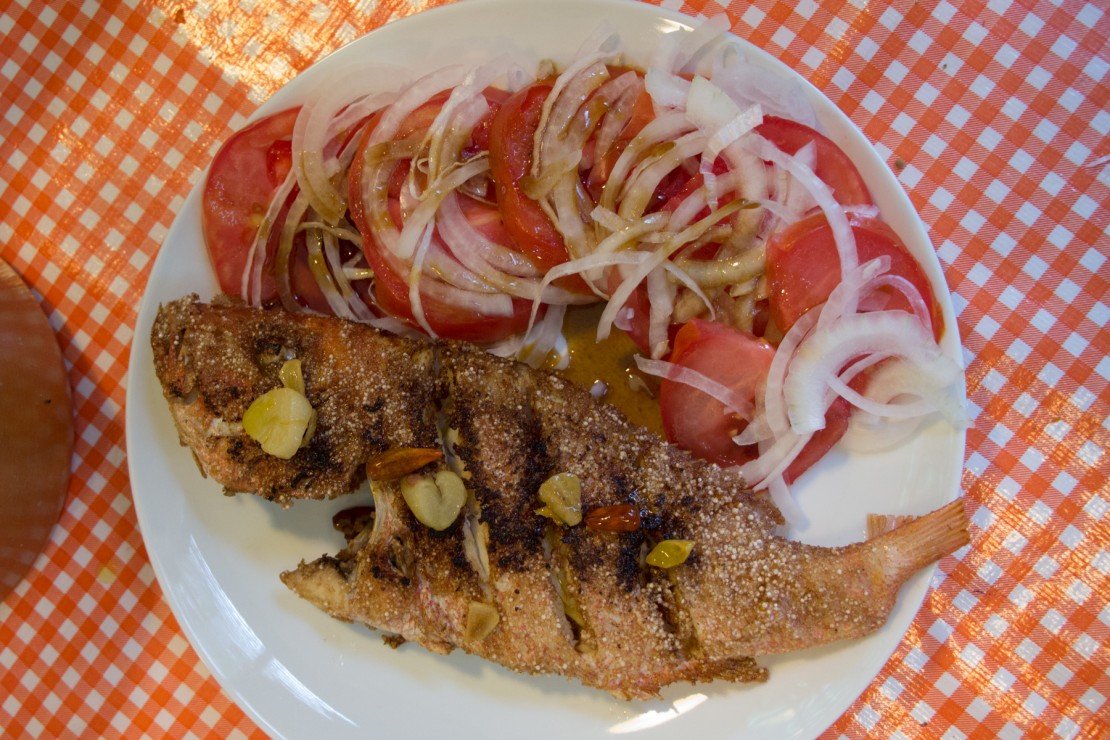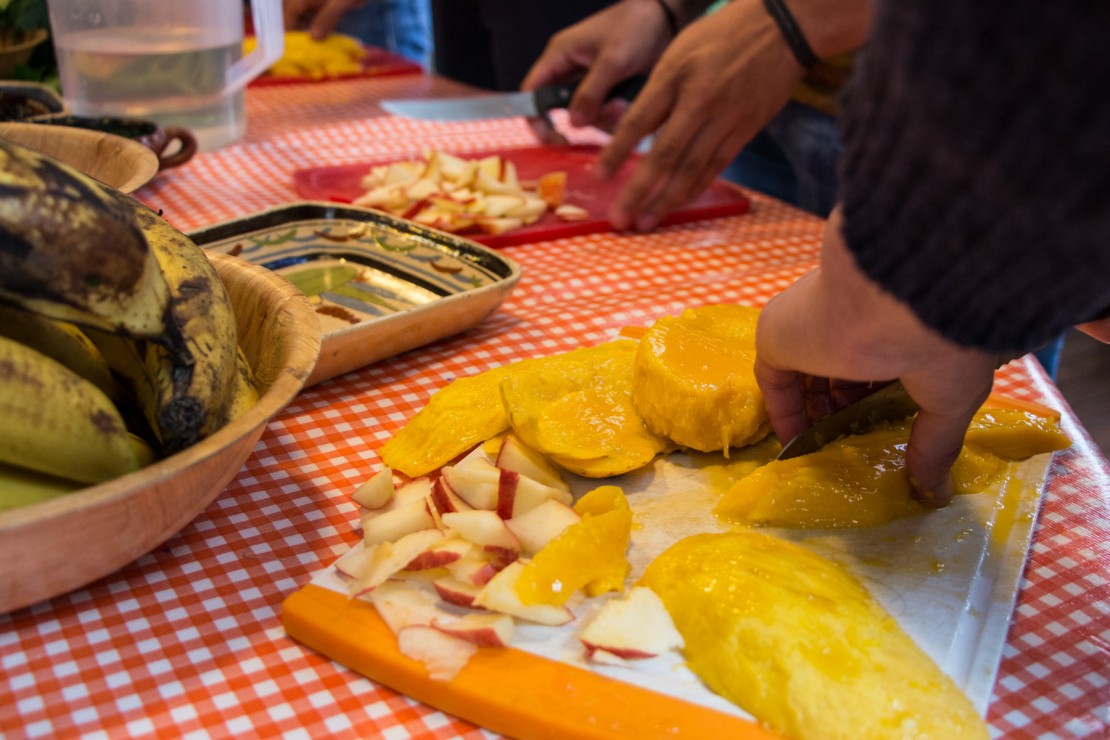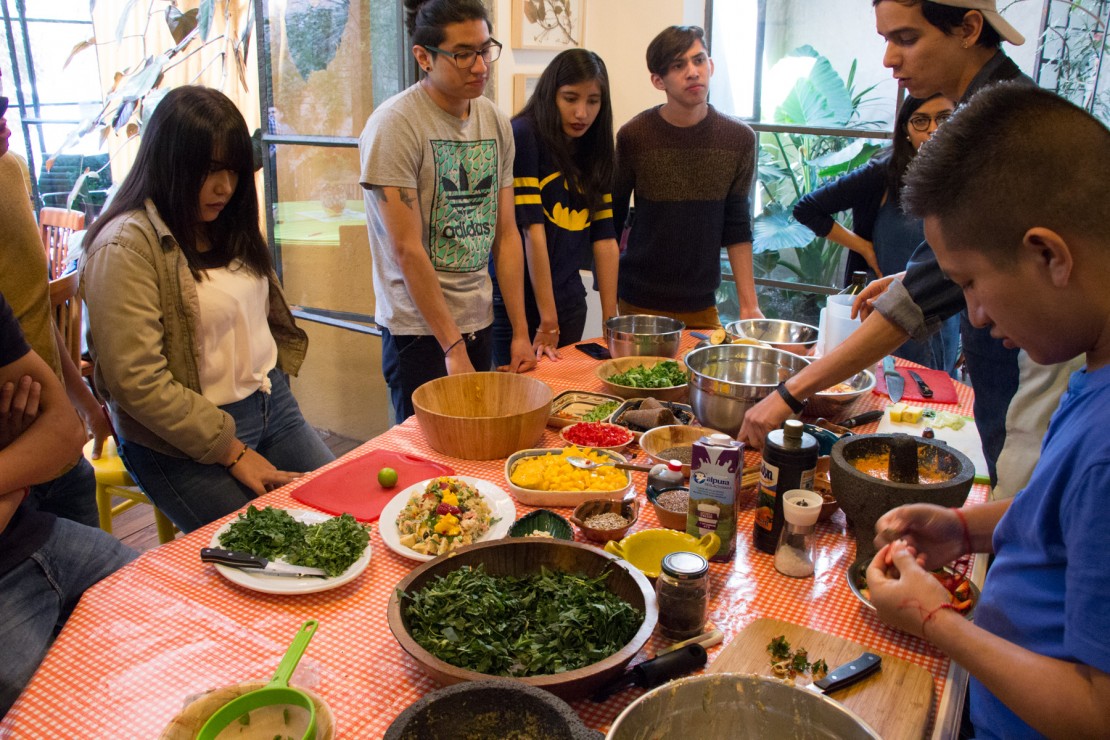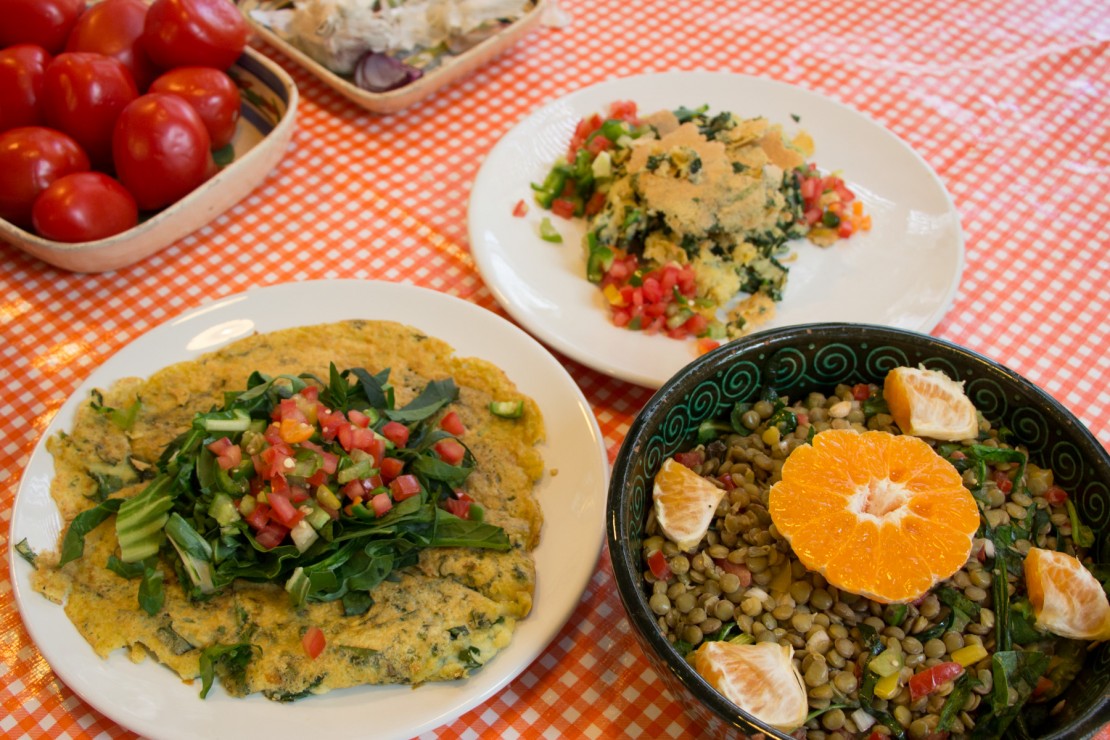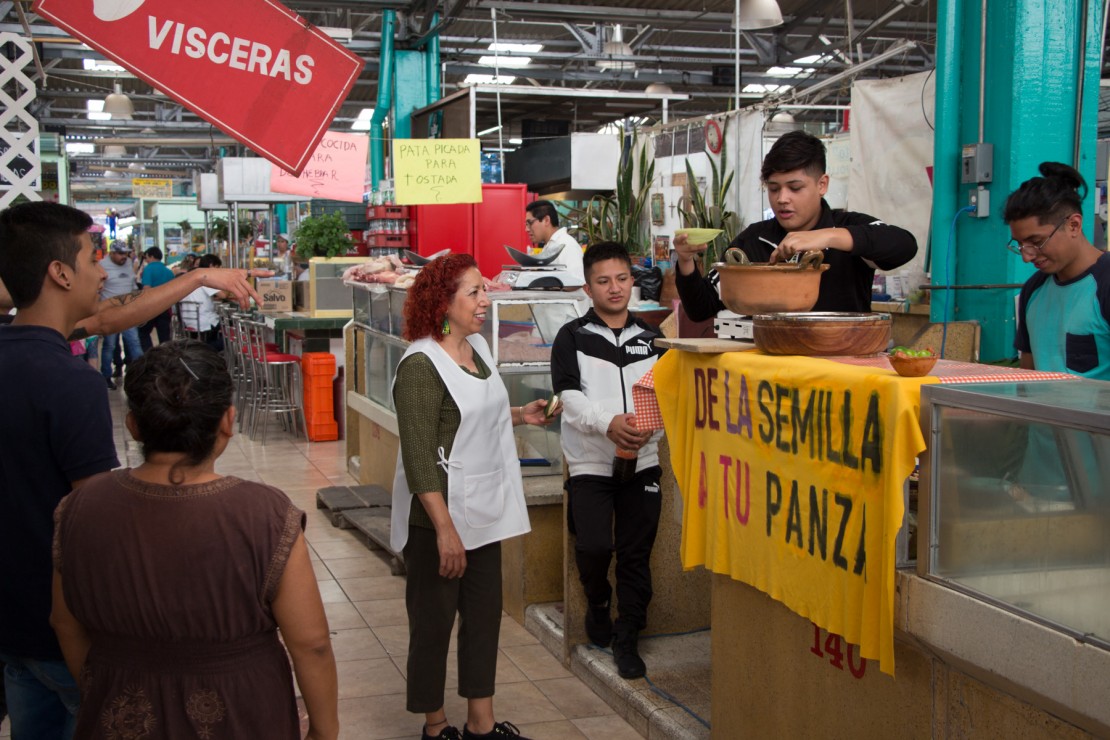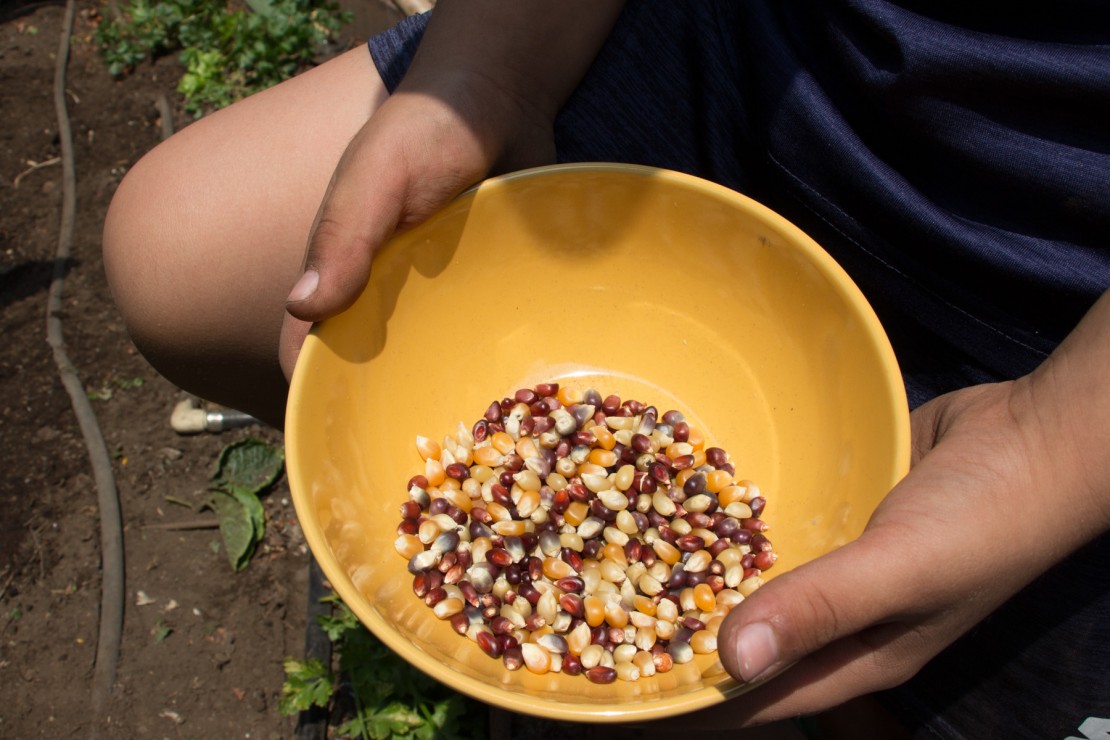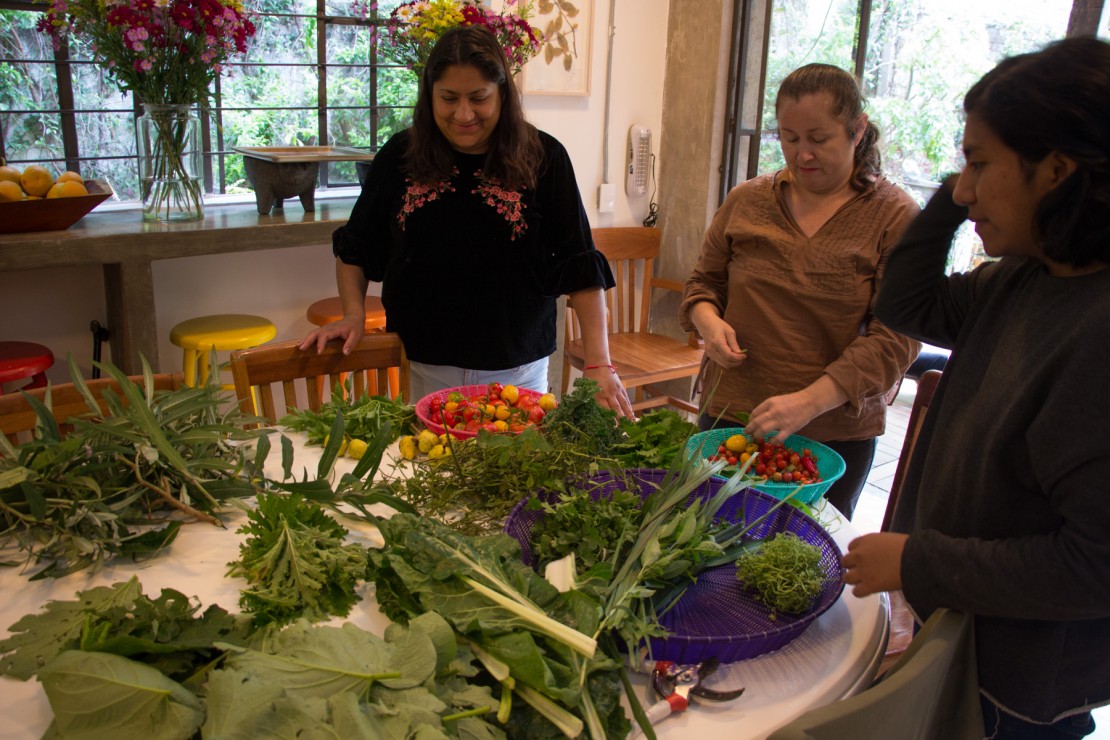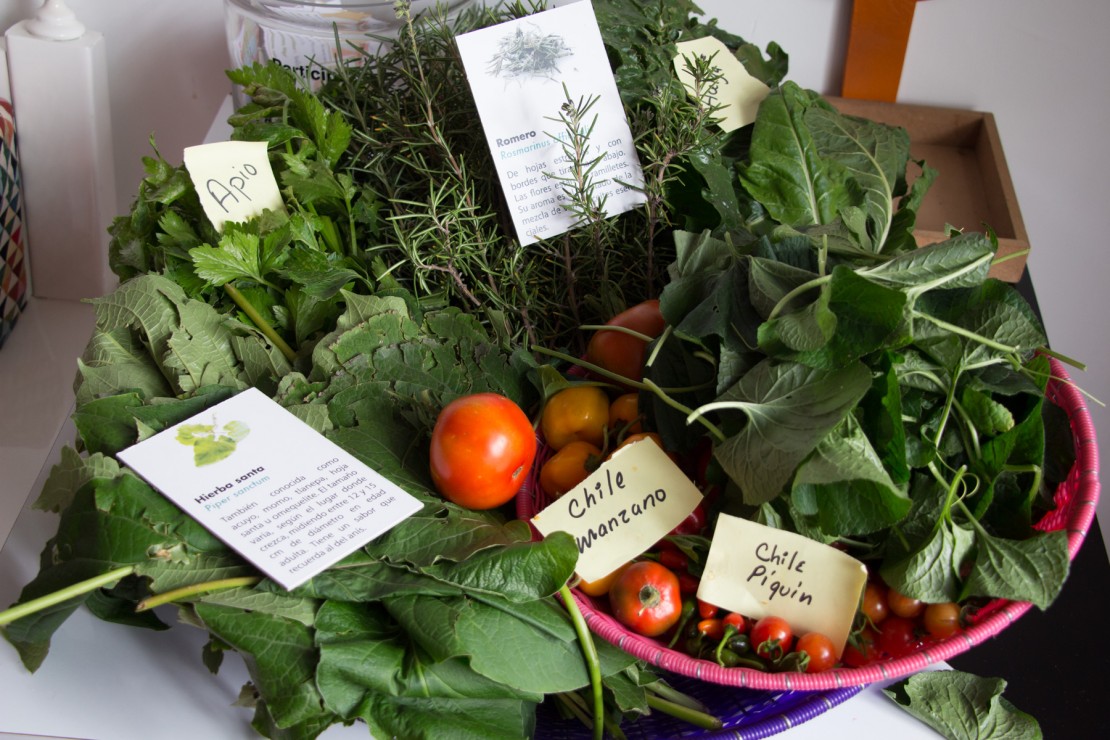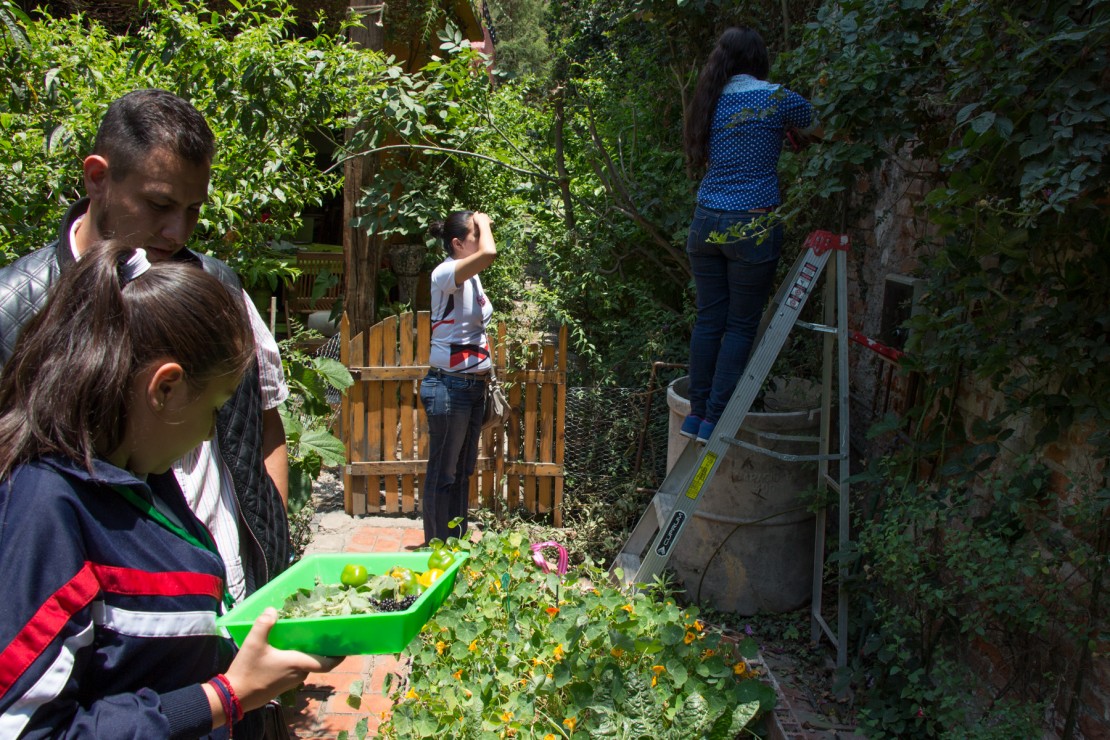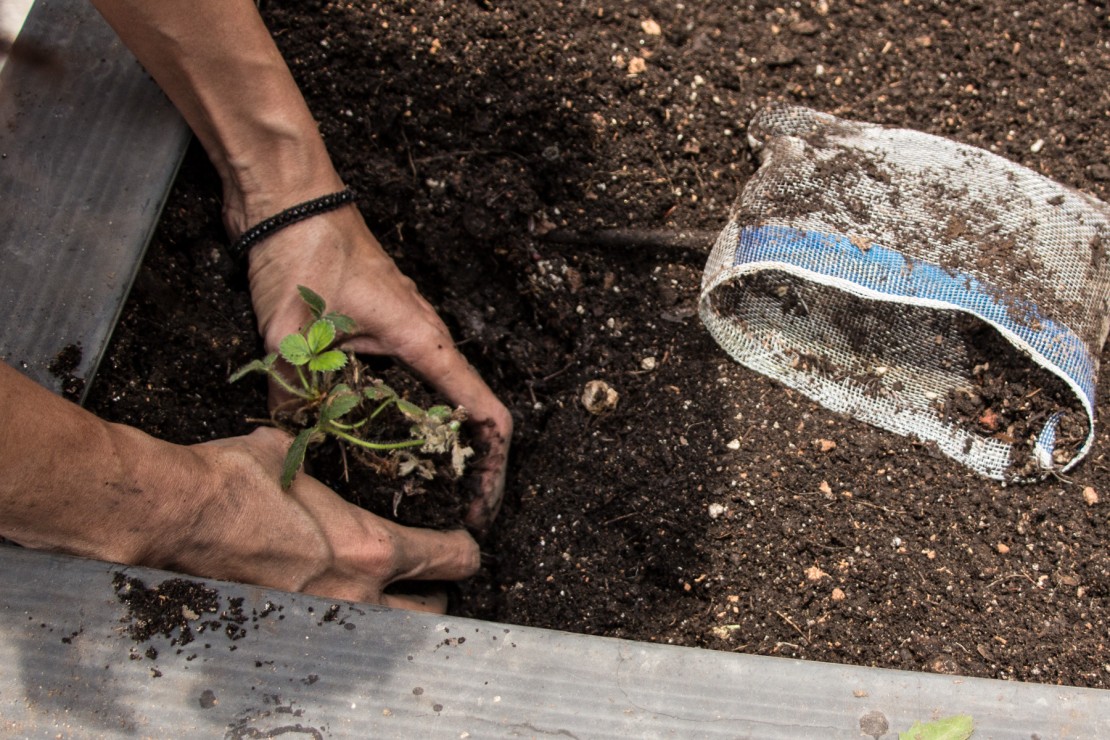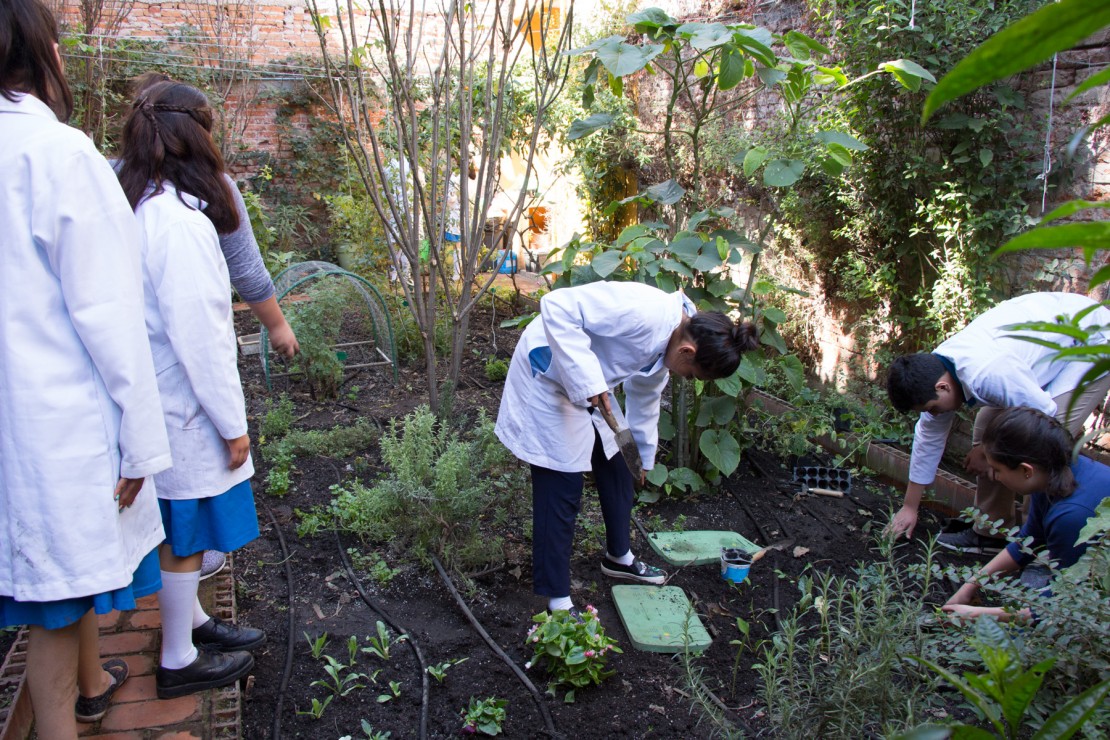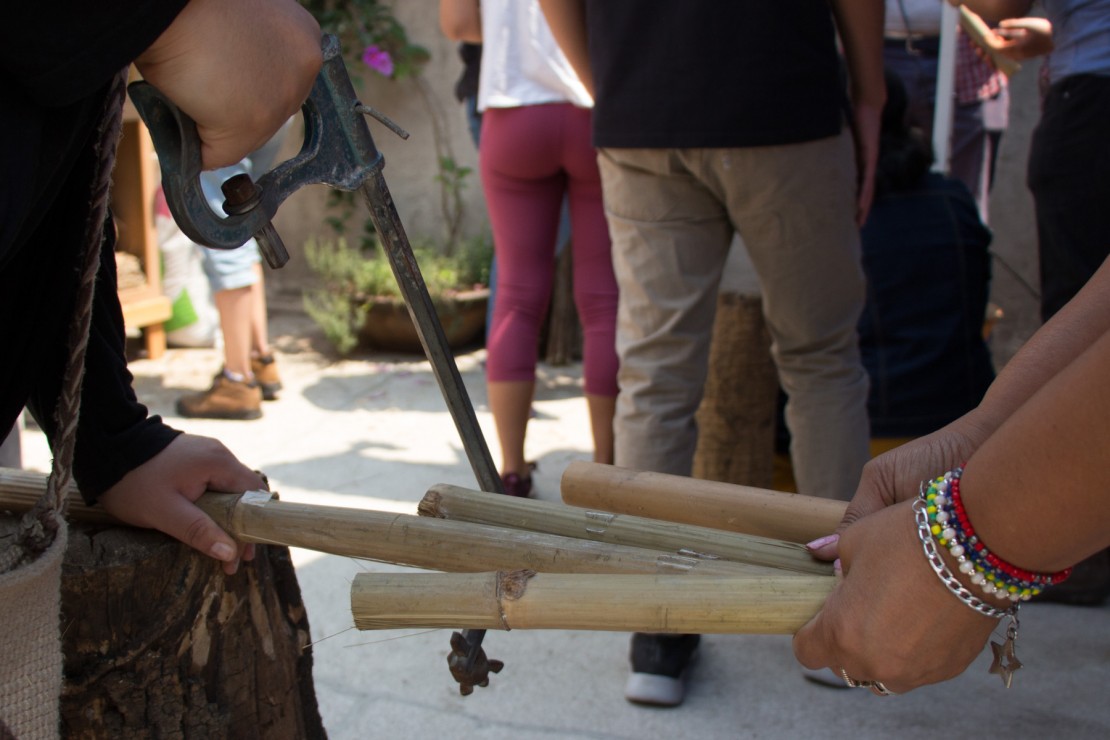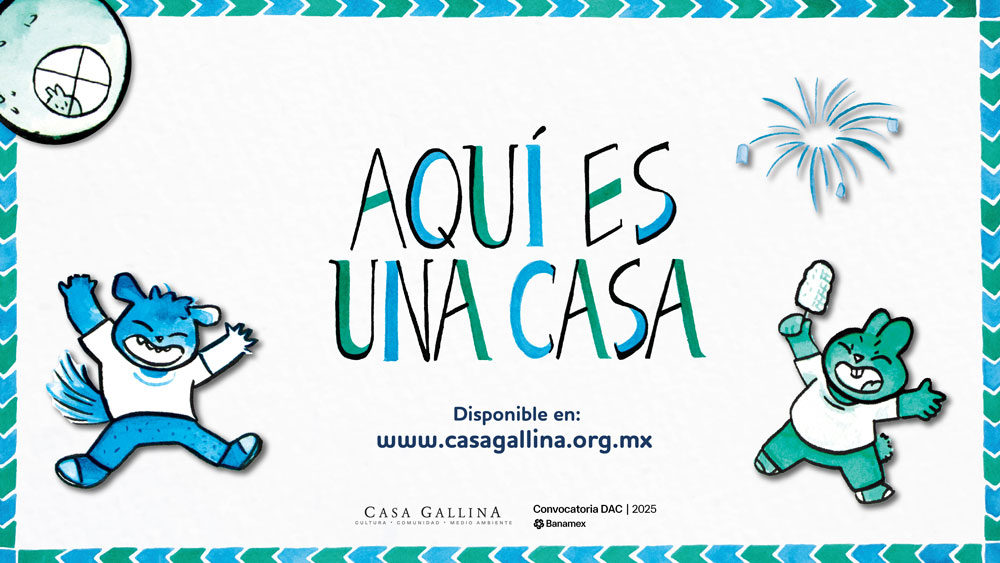Nutrition and Resilience: Responsible Consumption and Environmental Empathy
The main objective is to motivate neighbors about the importance of being aware of the ecological, social, and health implications of their decisions about food and consumption, as well as to inform them about alternative forms of preparation, production, and circulation of local foods, which return to traditional knowledges and that seek empathetic relations with the environment. In order to achieve these goals, this platform also includes the production of informational and didactic resources, which are temporarily displayed at Salón Huev@ and serve to introduce visitors to the platform’s most important contents.
Along this line, Casa Gallina has housed cooking workshops that use wild ingredients from the Valley of Mexico Basin, as well as workshops and consultating sessions on urban agriculture, focused on adapting ecological cultivation methods to the urban context, and film projections coordinated by neighborhood residents and invited specialists. These activities, with a shared thematic axis, allow for the work and energy of the neighbors participating in each one of them to be integrated and to complement one another. The conversations that occur in the film projections expose relevant interests and problems that are addressed in new workshops and encounters. Similarly, the agriculture and kitchen activities are kept in sync, so that Casa Gallina’s garden operates as a source of knowledge and ingredients that nourish the cooking workshops, which in turn reveal preparations of underused local ingredients that be grown in domestic gardens.
Flavours and Experiences From the Bajio Region - Conversation and Sampling
Date - March 29, 2025
Facilitated by - Yahreni Martinez
Allies - Rancho Orgánico Maria
Participants - 16 inhabitants of Santa Maria la Ribera
Neighbors learned about alternative ways to produce eggs, honey and various cultivations based on practices that seek to regenerate the land. The dialogue was enriched by the interest of participants and was reinforced by sampling honey, bread, cheese and xoconostle (sour prickly pear) that led the way to everyday life questions. There was also a demonstration on the freshness of the eggs and discussion about the landscape surrounding Valle de Santiago, starting by recognizing the palo blanco (picconia excelsa) seed, a tree that is essential to the Bajio region ecology.
Communal Shop - Organic Ranch Maria
Dates - March, 21, 22, 28 and 29, 2025
Facilitated by - N/A
Allies - Rancho Orgánico Maria
Participants - 63 inhabitants of Santa Maria la Ribera
The Organic Ranch Maria is a family initiative in Valle de Santiago, state of Guanajuato, that recovered deteriorated agricultural lands to transform them into a place for responsible production, conservation and recreation. Through three axes —an environmental unit, an ecotourism project and a free range chicken farm— they have built a model for caring for the territory and respecting natural cycles.
This edition of the communal shop saw the Martinez family offering neighbors their production of eggs and honey that result from practices that prioritize animal welfare and regeneration of the surroundings. This experience proffered a bridge between field and city and a chance to reflect on the forms in which we consume and relate with those who grow the food that reaches our table.
65th Anniversary of La Dalia Market
Date - March 14, 2024
Coordinator - Casa Gallina
Participants - 100 stand holders and consumers in La Dalia market
In the framework of the numerous celebrations held in early March to mark the 65th anniversary of La Dalia market, Casa Gallina donated 100 posters and 50 copies of the book “Stories and Flavors We Inhabit” for vendors and customers. The main recipients of the gifts were people who participated in making the book itself: suppliers of vegetables, herbs, animal products, etc. Copies were also distributed in the eating area and to several stands that prepare food, so they can take advantage of the recipes the publication shares, as part of the neighborhood’s memory concerning food.
Communal Shop - SECUAM and Chinampa Amanalli
Dates - February 21, 22 and 28, and March 1, 2025
Facilitated by - N/A
Allies - Sembrando Cultura Ambiental A.C. and Chinampa Amanalli
Participants - 83 inhabitants of Santa Maria la Ribera
The encounter with Sembrando Cultura Ambiental A.C. and Chinampa Amanalli welcomed to the neighborhood an agroecological proposal that combines responsible production, environmental education and defense of territory.
Both initiatives, launched from Xochimilco by Citlalli Hernandez Jimenez, place the chinampa (floating garden) as an axis for reflection about water, biodiversity and food sovereignty.
These days provided a space that allowed neighbors to get to know regenerative practices and have access to produce cultivated with high environmental commitment, hence reinforcing the relation between buying local and sustainable production systems.
Floating Herbs and Travelling Salt - Workshop on Seasonings
Date - February 28, 2025
Facilitated by - Laura Jimenez and Citlali Hernandez
Allies - Sembrando Cultura Ambiental A.C. and Chinampa Amanalli
Participants - 14 inhabitants of Santa Maria la Ribera
This workshop was proposed by the organization to disseminate the chinampa’s food culture. This session broached the variety of wild greens and aromatic herbs available to prepare three seasonings, along with the mineral characteristics of salt from the Cuyutlan salt beds, in the state of Colima. The exchange generated an enriching dialogue among neighbors, who shared experiences on the smells, flavors and recipes while they created three different seasonings for daily use in home cooking recipes.
The City In a Basin - Chinampas and Edible Gardens. Conversation and Sampling.
Date - February 22, 2025
Facilitated by - Citlali Hernandez
Allies - Sembrando Cultura Ambiental A.C. and Chinampa Amanalli
Participants - 15 inhabitants of Santa Maria la Ribera
The environmental educator Citlali Hernandezparticipated in this conversation/sampling and shared with neighbors the technical principles and cultural factors surrounding the chinampa, an ancestral agricultural system that is still practiced around the Valley of Mexico. Participants were able to smell, feel and taste the diversity of plants and flowers from Chinampa Amanalli, located in Caltongo Xochimilco, and have a pleasant and enriching discussion that helped them appreciate and understand the important legacy of this cultivation, the terrain that supports it, the production it enables and the need for, and value of, water.
Workshop on Composting at Home
Dates: November 23 and 30, 2024
Workshop Leaders: Fabiola Gallardo and Huerto Atlampa
Participants:9 adult inhabitants of Santa María la Ribera
Within the framework of the orchard activities, we raised awareness on the importance of knowing how to produce fertile soil with nutrients. Participants in the workshop used their daily organic residues to learn different ways of making compost. In alliance with Huerto Atlampa, a communal space in an adjacent neighborhood, the neighbors became involved in a communal composting program in which they exchanged waste for a space where they can harvest.
Communal Shop - Ziranda´s Gourmet
Dates: October 18 and 19, 2024
Guest: Ziranda´s Gourmet
Participants: 178 neighbors from Santa María la Ribera
During October we hosted Ziranda´s Gourmet, from San Antonio Tecomitl, in the municipality of Milpa Alta, who have focussed on discovering and trying recipes made with native corns: traditional candies, atole concentrates, concentrated soups, large cookies, pinole, amaranth, loaf bread, among others. This wide variety joined the array that the Communal Shop promotes for the neighbors of Santa María la Ribera, who have started to recognize this space as a place of interest to improve the food they consume.
Workshop - Making Marzipan
Date - October 19, 2024
Workshop Leader - Laura Padilla
Participants - 12 neighbors from Santa María la Ribera
In line with the participation of Ziranda´s Gourmet in the Communal Shop, Laura Padilla, cook and producer, shared a recipe to make a variety of a typical candy, marzipan, in this case made with native corn from Milpa Alta. The neighbors who participated prepared pinole from scratch, manually grinding the ingredients to turn it into a nutritious dessert - the Ziranda's Gourmet marzipan.
Friends Dining Blindly: There Are Mushrooms in September Too
Date: 18 September, 2024
Ally: CONUCO
Participants: 14 inhabitants of Santa Maria la Ribera
We had a dinner among neighbors led by Laura Linares and Amaranta Ramírez from CONUCO. The attendants enjoyed a menu based from starter to dessert on seasonal wild mushrooms. During the meal they were able to talk with the leaders, who are also authors of the Gastronomic Dictionary of Mexican Mushrooms.
Workshop: Cheese-making Processes
Date: 24 August, 2024
Workshop leader: Cipactli Suárez
Ally: La Bolchevitta Farm
Participants: 15 inhabitants of Santa Maria la Ribera
In this workshop, taught by Cipactli Suárez of La Bolchevitta goat farm, neighbors learned about dairy production and the main processes to make cheese. In the practical part each neighbor made 2 cheeses using different techniques to curdle the milk.
Workshop On Making Sunscreen
Date: 10 August, 2024
Led by: Kyria Alexa Valladares
Ally: Azul Verde
Participants: 15 inhabitants of Santa Maria la Ribera
In this workshop, led by Alexa Valladares of Azul Verde, neighbors learned how to care for their body by using cosmetic products, as well as the components and how to make sunscreens. During the practical part they made a sunscreen with cocoa butter and shea.
Workshop On Body Cream
Date: 20 July, 2024
Led by: Kyria Alexa Valladares
Ally: Azul Verde
Participants: 15 inhabitants of Santa Maria la Ribera
In this workshop, led by Alexa Valladares of Azul Verde, neighbors learned about the benefits of phytocosmetics and skincare not only for aesthetic reasons but also health ones. During the practical part the neighbors learned the bases and procedures to make body cream and prepared their own.
Collaboration Between Casa Gallina and Las Kitchenistas
Dates: 3 and 4 July, 2024
Guests: Las Kitchenistas from National City, CA.
Participants: 34 neighbors from Santa María La Ribera
Through the alliance with las Kitchenistas, who visited us from Olivewood Gardens and Learning Center, a house/garden located in National City, southern California, we hosted several events surrounding healthy food and community links involving neighbors in Santa María la Ribera.
On Wednesday 3rd, we organized an encounter where 11 people participated in a dinner prepared by las Kitchenistas. They shared delicious and healthy dishes that are part of their Cooking for Salud program. The neighbors and guests were able to talk about the importance of gastronomy in personal identity, striving for healthy cooking and the emotions generated by an atmosphere of trust, where a common interest in nutrition is shared.
On Thursday 4th we projected the documentary The Kitchenistas Movie in the presence of its protagonists, Patty Corona, Angélica Gastelum, Sabrina Falquier and Claudia Guardado, in addition to producer Mary Ann Beyster. An audience of 23 people were able to delve into their project of healthy traditional food and its environmental, social and health impact on their communities. Followed by a dialogue on the importance of community union, the preservation of culinary traditions and non-processed food as a form of resistance to favor a healthy life.
Workshop On Seasonings
Date: 29 June, 2024
Led by: María Teresa Brambila
Ally: Rancho El Arco Agroecological Ranch
Participants: 16 inhabitants of Santa Maria la Ribera
In this workshop, led by María Teresa from El Arco Agroecological Ranch, a new group of neighbors had the chance to experiment, through a sensorama, the qualities of different aromatic herbs used in cooking, along with their properties and then, under the guidance of the leader, create their own combinations and thus produce seasonings to accompany their meals.
Workshop On Preserves
Date: 22 June, 2024
Led by: María Teresa Brambila
Ally:El Arco Agroecological Ranch
Participants: 16 inhabitants of Santa Maria la Ribera
Continuing the line of healthy eating, María Teresa showed the participating neighbors the process to make and preserve sweet and savory preserves, as a way to take advantage of seasonal fruits and complement their nourishment without risking their health. During the practical part the participants made an apple-cinnamon preserve and another with mango-chile.
Seed Strips
Date: 25 May, 2024
Facilitated by: Aseneth Ureña
Participants: 16 inhabitants of Santa Maria la Ribera
The workshop focused on germination through the technique of seed strips, which proposes the use of reused paper to concentrate the number of seeds to germinate and increase the probability of success in the germination process.
The creation of seed strips enables a more assertive germination process, in addition to which the participants shared stories and affective memories they have shared with plants during each strip.
Workshop On Herbalist Medicine Cabinet
Date: 18 and 25 May, 2024
Led by: Olmo E. Manrique Navarro
Ally: Oyameyo Cooperative
Participants: 18 inhabitants of Santa Maria la Ribera
This workshop shared the benefits and uses of herbalism in personal care. The participants learned various medicinal uses of easily found plants. During the practical part the participants made tinctures, syrups and pomades for daily use.
Water For the Plants
Dates:20, 27 April and Saturday 11 May, 2024
Facilitated by: Camilo A. Pérez
Participants: 14 inhabitants of Santa Maria la Ribera
During 3 sessions neighbors researched tools and methods for self-watering of ornamental and edible plants. Each was able to create a plant pot with reused materials in which they placed a tomato seedling to experiment with this way of providing water. The workshop also served as a space to share experiences and solutions facing the neighborhood hydric crisis.
Workshop: Cooking with the Kitchen Garden
Date: 5 and 12 de marzo de 2024
Coordinated by: Casa Gallina
Facilitated by: Camilo A. Pérez and Umani Fermentos
Allies: José Vasconcelos Middle School, no.46, and Umani Fermentos
Participants: 17 girls and boy students from Santa Maria la Ribera
Format: in person
Over the course of two sessions, first-year middle school students learned how to recognize, dry and use plants from the kitchen garden to prepare food and beverages such as pesto, shrub (a natural syrup to make beverages) and pickles.
64th Anniversary of La Dalia Market
Date: March 5 de, 2024
Coordinated by: Casa Gallina
Participants: 200 stall holders in La Dalia market
Format: in person
To commemorate the anniversary of La Dalia market, neighbors distributed a gift to all the stall holders, as a gesture of thanks for their 64 years of work. It consisted of a recipe book with home remedies using ingredients available in La Dalia market, along with a soap they had made at Casa Gallina
Workshop on Elaboration of Artisanal Soaps for La Dalia Market
Dates: February 26 and 28, 2024
Coordinated by: Casa Gallina
Facilitated by: Marisol Torres
Participants: 10 neighbors from Santa Maria la Ribera
Format: in person
Through this workshop, neighbors reinforced their knowledge on how to make soaps under the guidance of cosmetologist Marisol Torres, who helped us through the mass fabrication of these products that were given to stall holders in La Dalia market. The workshop included a space to respond to questions and learn more about natural cosmetics.
Lake Cooking from Tlahuac
Date: December 9, 2023 to February 10, 2024
Cook: Aracely Marquéz
Ally: De la chinampa a la cazuela (From chinampa to cooking pot)
Participants: 30 inhabitants of Santa Maria la Ribera
Format: in-person
This program aimed for the neighborhood community to research and reflect upon the links between our city’s lacustrine past and the culinary heritage of the original peoples who maintain traditional recipes. We invited the cook and promoter Aracely Marquez to share ingredients, preparations and recipes from the community in Tlahuac, which are part of the region’s gastronomic traditions. Recipes that are healthy and are linked to the territory.
Aroma of Earth, Tamales and Mushrooms
Date: November 25, 2023
Cook: Patricia Márquez
Allies: Ocomantla Community Productive Center
Participants: 16 inhabitants of Santa Maria la Ribera
Format: in-person
This program aimed at learning the important link between food and territory. We invited the cook and promoter Patricia Márquez, a member of the Ocomantla Community Productive Center and the Kuxán cooperative, who taught us how to prepare a family recipe of mushroom tamales, characteristic ingredients in the Highlands in the North of Puebla. This program focusses on leaning and reflecting about the benefits of knowing the origin of the products that reach our home, as well as understanding the relationship between food security, proximity and territory.
Flavors and Knowledge of the Maize Field - Food, Medicines and Rituals
Facilitated by: Angélica Palma, Rosalba Rodríguez and Jaky Valdéz
Ally: Calpulli Tecalco
Participants: 28 inhabitants of Santa Maria la Ribera
A series of workshops was developed in alliance with Calpulli Tecalco, in order to share the benefits of all the plants present in a maize field. The participants learned how to identify different types of herbs and their specific uses. They also discussed how a maize field fosters healthy consumption not only as nourishment, but also by providing multiple benefits to the cultures in the Valley of Mexico, including medicinal plants and others that are used for ritual purposes. Thus, the maize field meets the body and the community’s needs in different ways.
Edible Surroundings
Dates: June 24, July 1, 8 andy 15, 2023
Coordinated by : Casa Gallina
Facilitated by: Alonso Camilo Pérez
Participants: 18 neighbors from Santa María la Ribera
In this workshop, neighbors learned how to plan and adapt venues for social interaction which can include edible plants for ornamental purposes, to provide shade and/or to attract pollinators.
Cooking For Children
June 24, July 1,8 and 15, 2023
Coordinated by: Casa Gallina
Facilitated by: Umani Fermentos
Participants: 26 neighbors from Santa María la Ribera
In this workshop preschool aged girls and boys, along with their families, sampled natural and healthy foods in a fun way through play, as a positive way of approaching cooking.
Sharing Cooking - Workshops on Food from Calpulalpan
Dates: Saturdays July 1 and 15, 2023
Facilitated by: Yara Muñoz
Ally: Artisanal Products Oly
Participants: 37 inhabitants of Santa María la Ribera
Yara Munoz has perfected a recipe made with non-nixtamalized corn flour from her own maize field leavened with xaxtle (pulque sediment), which is native to her place of origin, Calpulalpan, in the state of Tlaxcala. In these workshops she shared her bread recipe with inhabitants of Santa Maria la Ribera along with other traditional recipes for produce from maize fields in her region: red corn, xoconostle cactus, etc. Being easy to put into practice in daily nourishment, her recipes resounded with the inhabitants of Santa Maria la Ribera.
Seed Exchange
Date: July 12 de, 2023
Coordinated by: Casa Gallina
Allies: Somos Semillas, Huerto Tlatelolco and the Ocomantla Communal Production Center
Participants: 13 people
This encounter gathered neighborhood orchard growers and representatives from various organizations focused on agriculture, thus launching a process that will culminate in a publication that includes their experiences in caring for and collectively safeguarding agroecological seeds.
Nature In the Body - Preparing Natural Cosmetics
Dates: Wednesday June 14, 21 and 28, July 5, 2023
Facilitated by: Marisol Torres
Ally: Muyal
Participants: 20 inhabitants of Santa Maria la Ribera
This workshop invited neighbors to learn how to prepare different personal care products following the principles of natural cosmetics. During this activity, participants experimented with different formulas and preparations based on essential oils and products that can safely be used on the body in order to make deodorants, shampoo and face or body creams. These workshops help the community reflect on industrial cosmetics and their effect on the body and environment. It also provided a platform to put into practice knowledge that can further personal and family autonomy with regard to this industry.
Communal Orchards
March - May 2023
Facilitated by: Alonso Camilo Perez
Participants: 15 inhabitants of Santa Maria la Ribera
Format: in-person
Over the course of six sessions, neighbors who regularly grow vegetables reinforced their knowledge on agroecology through the planning of long-term work strategies. This was done in accordance with the conditions of their spaces and the communal benefits that each can provide. They also worked on designing and planning to reorient the sense of certain planting spaces within Casa Gallina, in preparation for new educational activities.
Agroecology Detectives
15 -31 May, 2023
Facilitated by: Moisés Ledesma
Allies: Hagamos composta, Mercado la Dalia and Pausita Café
Participants: 32 girls, boys and adolescents, inhabitants of Santa Maria la Ribera
Format: in-person
A program of activities for children and adolescents between the ages of 5 and 16, divided into 3 age groups. The aim was to help youngsters get involved in the world of agroecology with the question: Where do the ingredients in your favorite dish come from? The children and adolescents researched the topic by creating the character of a detective whose mission is to explore the situations, people and agents involved in the food system in their community. From the seed, the market, the kitchen and waste, the participants carried out interviews, visited the market and completed the program with a neighborhood map that chronicled their movements and the places where foods are consumed locally.
Agriculture For Children
15 February, 22 February, 1 March, 8 March, 15 March, 22 March
Facilitated by: Alonso Camilo Pérez and Moisés Ledesma
Participants: 14 girls and boys, inhabitants of Santa Maria la Ribera
Format: in-person
This process saw the implementation of fun dynamics to transmit to children the notions of general techniques of urban agriculture, motivating them to reflect upon their daily relationship with plants. They prepared substratum, separated roots and transplants, and closely followed the process of plant germination at home.
Cooking Workshop for Preschoolers
25 February and 11 March, 2023
Facilitated by: Umani Fermentos
Participants: 47 inhabitants of Santa Maria la Ribera
Format: in-person
Girls and boys aged between 3 and 5, accompanied by their mothers, grandmothers and fathers, approached different natural ingredients. Starting with the creation of edible jewelry, they learned how a plate with ingredients of different colors is related to the balanced integration of their nutritional properties.
Self-managed Cooking
Date: November to December 2022
Facilitated by: Umami Fermentos
Participants: 19 adolescents, inhabitants of Santa María la Ribera
Format: in-person
Over the course of five sessions, strategies on conscious nutritional decision making were shared, along with healthy recipes. To conclude, they carried out an exercise on choice and purchase of fresh ingredients with which the teams prepared a dish to share with the community.
The Sense of the Garden
Date: February to November 2022
Facilitated by: Sami Esfahani
Allies: Centro Cultural Universitario Tlatelolco
Participants: 13 inhabitants of Santa María la Ribera
Format: in-person
During this workshop thirteen women who plant at home had a space for dialogue within Casa Gallina and in certain of their gardens and orchards, to reflect upon the motivations, emotions and thoughts involved in the cultivation process. They also visited the exhibition Renaming the World: Botanical Expeditions in New Spain and made herbalist preparations with the plants most frequently mentioned during the sessions. At the end, each recorded her most relevant reflections in a text, in order to form a book that is currently being edited.
Learning Through Doing - LABNL Communal Orchard
Date: October 24 - 29, 2022
Coordinated by: Casa Gallina, LABNL
Facilitated by: Alonso Camilo Perez
Participants: 14 people linked to LABNL
Format: in-person
The Citizens’s Cultural Laboratory from Nuevo León welcomed the Casa Gallina team in order to develop a workshop that gathered people to question practices and ways of relating to the environment, share experiences and build collective knowledge about collective urban agriculture. At the end of the week, the book The Distributed Orchard: Experiences of Shared Urban Agriculture was presented and handed out.
Urban Orchard Workshop for Adolescents and Adults
Date: August to September 2022
Taught by: Alonso Camilo Perez
Participants: 16 inhabitants of Santa María la Ribera
Format: in-person
The theoretical principles of permaculture adapted to urban contexts were shared, based on analyzing the planting conditions of the participants. During these sessions they determined the types of plant each of them could cultivate in pots that were appropriate for polyculture, which they took home for follow-up and appropriation.
Your Home Kitchen Garden. Introduction to Urban Agriculture Workshop
Date: June-August 2021
Coordinator: Alonso Camilo Pérez
Participants: 12 neighbors
Format: mixed
Horticulturist Alonso Camilo Pérez led the workshop that introduces urban agriculture “Your Home Kitchen Garden”. In addition to the practical exercises, this workshop offered constant reflections on the agroecological dimension of urban agriculture. This is the third online workshop introducing urban agriculture since the start of the pandemic, the classes were planned according to a prior diagnosis of the participants’s planting areas and their progress was monitored via WhatsApp. At the end, those completing the workshop continued learning about the topic, joining the network of kitchen gardens linked to Casa Gallina in which more experienced neighbors offer advice and mutual help, forging dynamics of exchange and collective work.
Training in the Preparation of Pickled Products
Date: June-August 2021
Coordinator: Ixchel García Galvez, Juan Carlos Hidalgo and Jorja (Umani fermentos)
Participants: 18 neighbors
Format: Online
This course reviewed the theoretical concepts of different methods of fermentation and prepared vegetables pickled in: brine, sauerkraut, base vinegar mead, butter, water and milk tibicos, sour cream, among other methods. The participants created a WhatsApp group in which they shared their setbacks and triumphs, new interests in learning and unexpected discoveries, receiving constant feedback from the workshop leaders.
The Casa Gallina Vegetable Garden
Date: April-July 2021
Facilitator: Dante Aguilar
Participants: 26 live spectators
Format: Online
Short video clips in which horticulturalist Dante Aguilar presents some of the particularities found in the Casa Gallina vegetable garden according to the changing climatic conditions over the summer. This series, available on the Casa Gallina Youtube channel, particularly reviews plants commonly flowering at this time of year, such as parsnip, onion, Mixtec cucumber, Ayocote bean, among others; so as to delve into aspects such as obtaining seeds, various forms of polizination and the role insects, butterflies and birds play in this process.
Tips for Storing Your Food
Date: July 2021
Facilitator: Miguel Iwadare
Format: Online
Interactive PDF with tips on how to store vegetables, divided into seven main categories: fresh produce; fresh chile peppers; water-rich (tomatoes, green tomatoes and cucumbers); bulbs; tubers; cruciferous and aromatic herbs. It also includes information and useful resources on how to be more efficient in the kitchen through planning grocery shopping, storage and food preparation, so as to reduce costs and waste.
Network of Home Vegetable Gardens: Follow-up
Date: permanent
Coordinator: Alonso Camilo Pérez, Valentina Sánchez and Dante Aguilar
Participants: 35 neighbors
Format: Mixed
As a result of emergency planning due to Covid-19, in 2020 a network for distance support began to emerge between Casa Gallina and neighbors who plant vegetables at home. Using tools such as WhatsApp groups, online workshops, mapping and participative diagnosis. This network links over twenty home kitchen gardens in different conditions, which are in constant touch and interact among themselves through the exchange of seeds, cuttings, mutual support and volunteering in the Casa Gallina garden. A publication is being edited in collaboration with, and coordinated by, Valentina Sánchez, to rescue the memory of this first year of work.
Introduction to Urban Agriculture
Dates: March–April, 2021
Coordinated by: Alonso Camilo Pérez
Participants: 16 neighbors
Format: Hybrid
Horticulturist Alonso Camilo Pérez taught the Introduction to Urban Agriculture workshop, in which participants learned the theoretical and practical principles of agroecology and received personalized advice to help adapt these principles to the specific conditions of space, light and orientation where each of them would grow their garden. After specific analysis of each case, Casa Gallina provided the most appropriate materials—type of container, seeds and substrates—so each garden would grow in the most optimal way.
Seed Guardians
Dates: January–April, 2021
Coordinated by: Dante Aguilar, Alonso Camilo Pérez, Valentina Sánchez
Participants: 16 neighbors
Format: Hybrid
The Seed Guardians program aims to contribute to the agroecological seed pools. It consists of a series of activities in which sixteen neighbors, who have their own gardens, participate in the development of seeds from the collections of Huerto Mar Redondo and Casa Gallina. Participants receive continuous advice via WhatsApp and a monthly online session; they also visit Casa Gallina to exchange plants and supplies. Among the seed species protected by this group are: Mixtec cucumber, hanging tomato, forest strawberry, cape gooseberry and sorrel, among others.
Cooking with Neighbors
Dates: March 23 to April 23, 2021
Facilitator: Lizbeth Maximino
Live broadcasts
Cooking with Neighbors is a series of video capsules in which a guest chef creates some recipes previously taught during Casa Gallina workshops. Lizbeth Maximino, a neighbor and cook, selected four recipes from previous workshops taught by Álvaro Andrade, Raúl Gómez, Niki Nakazawa and Diego Inzunza.
Along with the broadcasts, cookbooks from previous workshops were shared, as well as a new cookbook with the recipes prepared by Lizbeth Maximino:
Recipes: Eggplant tacos with holy leaf, almond bread, bean broth with nopales, pumpkin lasagna with mushrooms, cornfield soup, enchiladas nuts, red salad and mushroom tinga.
The Colors of the Ingredients Found in the Vegetable Garden
Dates: November 28 and December 5, 2020
Coordinator: Rodrigo Flores
Participants: 21 neighbors
Rodrigo Flores, a neighbor and illustrator who specializes in creative stimulation workshops for kids, coordinated this activity in which the participants experimented with the possibilities of using leaves as tools to express themselves visually, while paying special attention to their shapes, textures and colors. In the second session, once they had learned the techniques that Rodrigo transmitted to them, the kids intervened one of the walls at Casa Gallina using some of the leaves from the vegetable garden as inspiration. Each participant also recycled an old T-shirt by printing on it a relief of a Mexican pepperleaf herb.
Herbal Preparations for Children’s Doses Workshop
Dates: November 28, 2020
Coordinator: Sami Esfahani
Participants: 15 neighbors
Format: Online
This activity was attended by parents interested in learning a variety of herbal recipes that would support their children’s health care. They were informed specifically about sticking to the strict margins of safety when being given to children, and how these recipes are focused on children’s tastes and palates, which makes them easy to administer.
Medicinal Preparations from the Milpa Alta Tour and Workshop
Date: November 28, 2020
Coordinator: Angélica Palma
Participants: 72 live views
Format: Video tour and live broadcast
This activity brought together residents of Santa María la Ribera interested in learning the qualities of plants present in the fields of the Milpa Alta region, such as pennyroyal, stafiate, muicle, and espinosilla, among others, with a view to maintaining and making best use of these natural resources as common household pharmaceuticals. The activity included sharing some plant care tips: correct drying, tying and storage towards taking advantage of their active ingredients.
Food and Childhood in Family Holidays
Date: November 25, 2020
Coordinator: Ixchel Aguilar
Participants: 17 connected to the live transmission, 681 reproductions
Format: Facebook Live
Chef Ixchel García spoke about the importance of healthy eating habits during childhood, framed within the diabetes and obesity epidemic in Mexico, and showed how the holidays can be a great pretext to involve kids in the kitchen. This activity was based on a survey of eating habits and childhood previously conducted with residents of Santa María la Ribera linked to Casa Gallina.
Science in the Kitchen
Date: Tuesday, November 24, 2020
Coordinator: Juan Carlos Hidalgo
Participants: 40 connected to the live broadcast, 721 reproductions
Format: Facebook Live
Chef Juan Carlos Hidalgo gave a brief and clear explanation of the physical and chemical processes that make up the nutrient chains in food, and how the different cooking and preparation processes influence the way they are absorbed into the body. He offered some tips to streamline these processes and get all the good out of food. He also prepared a vegetable burrito as an example of a quick snack that meets the required energy and nutritional balance.
Herbal Preparations for Winter Illness Workshop
Dates: August 12 and 30, October 10 and 24, November 28
Coordinators: Sami Esfahani and Piedad Ramírez Corona
Participants: 110 neighbors
Format: Online
These series of activities, carried out between August and November 2020, dealt with Santa María la Ribera resident’s concerns about diseases associated with the winter season, paying special attention to the complications derived from the Coronavirus pandemic. The content was limited to those ailments that commonly arise during the winter: colds, pneumonia and influenza. The consideration of how to fortify the body's vital systems (immune, nervous and respiratory) was added in order to learn how to keep the body and its natural defenses in optimal condition toward avoid complications from COVID-19. Accordingly, the preparations taught were the ones used to regulate the nervous system, strengthen the immune system, and treat respiratory problems. A herbal recipe book was developed and distributed among and through Casa Gallina’s neighbor network.
Salad Dressings Workshop
Date: October 29, 2020
Coordinator: Juan Carlos Hidalgo
Participants: 25 registered neighbors; 45 connected live, 1264 reproductions
Chef Juan Carlos Hidalgo taught how to prepare three types of salad dressings that, in addition to being served as flavor enhancers, are also highly nutritious. Alongside explaining how to prepare them, he laid out which dishes they are best combined with. The dressings prepared were: a vinaigrette made with herbs from the vegetable garden, mayonnaise and Greek dressing.
Healthy Cooking Workshop for Kids
Date: October 17 and 24, 2020
Coordinators: Ixchel Aguilar, Juan Carlos Hidalgo
Participants: 33 neighbors
Format: Zoom
During two sessions, kids and their families learned the basics for cooking some healthy dishes: pumpkin-based pizza, unsweetened fruit soda and banana cookies. The participants connected via Zoom with each team consisting of family members. The learning process started with the instructions and recipes but improvisation and the use of other ingredients were encouraged. The teams also shared their processes and results with each other. After the workshop the participants received a notebook in which to record their final recipes, incorporating the extra ingredients they may have used.
Milpa Alta Tour and Cooking Workshop
Dates: October 6 and 10, 2020
Hosted by Angélica Palma
Participating: 60 live reproductions
Format: Video tour and online workshop
Angélica Palma invited the neighbors of Casa Gallina to get to know the cornfields’ biodiversity of the Milpa Alta region, as well as getting to know the lowland and highland regions of the town of San Pedro Atocpan, which are rich in ingredients for food and herbalism. She talked about the extractivist relationship of resources from the city to its surroundings and the complexity of maintaining a delicate balance with the neighboring native peoples and their territories. As a result of these tours, the host collected some ingredients which were then shared with the community during a cooking workshop in which the preparation of corundas (speciality tamales) in a tomato and chilies sauce was taught.
Vinegar Conserves Workshop
Date: September 29, 2020
Coordinator: Juan Carlos Hidalgo
Participants: 18 neighbors
Format: Zoom
Chef and neighbor Juan Carlos Hidalgo taught the basics to prepare pickled preserves, as well as how to integrate ingredients and balance acidic flavors. Accordingly, the participants learned how to plan their own preparations based on the ingredients they had to hand, especially considering those about to spoil, or those that, due to their qualities, cost or storage difficulty, are optimally preserved in vinegar. He also taught how to make homemade vinegar from fruit and liquor.
Plant Alternatives to Dairy Products Workshop
Date: September 12, 2020
Coordinated: Lizbeth Maximino
Participants: 19 neighbors; 25 neighbors connected to the live broadcast, 776 reproductions
Format: Facebook Live
Chef Lizbeth Maximino taught how to take advantage of seeds and grains such as chickpeas, amaranth, oats, and walnuts to make plant substitutes for dairy products. She explained the economic and nutritional benefits of opting for these homemade alternatives; with her help, the participants prepared a chickpea hummus with pepper and amaranth water.
Home Composting: Towards a More Sustainable Urban Agriculture
Date: Thursday, November 26, 2020
Alonso Camilo Pérez
Participants: 26 connected to the live transmission, 825 reproductions
Format: Facebook Live
The architect and horticulturist Alonso Camilo Pérez spoke about the relevance of compost to stop depending on the substrate resources of other territories, detailing its biological function, explaining some of the various composting methods and the types of spaces they work best in. He also shared with the audience two examples of composters provided by two residents of Santa María la Ribera. Finally, he invited the audience to share ideas for taking advantage of homemade compost for the benefit of the environment.
Solar Dehydrator Workshop
Date: October 28, 2020
Coordinator: Moisés Gerzam Ledezma
Participants: 23 participating neighbors; 54 connected to the live broadcast, 1,467 reproductions
Format: Facebook Live
The neighbor and actor Moisés Gerzam Ledezma taught how to make a model of a homemade solar dehydrator—made with embroidery rings, lightweight netting, cord and clothespins—that has three levels for dehydrating food in the sun. Ledesma explained how the solar dehydration of food allows to preserve seasonal ingredients without detracting from their nutritional quality. He also explained what kind of ingredients can be used and how they should be cut and placed for proper dehydration.
A Visit to Permanent Earth
Date: October 16, 2020
Coordinator: Javier de Cortina
Participants: 20 connected to the live transmission, 1,289 reproductions
Format: Facebook Live
Javier de Cortina conducted a virtual tour of the Permanent Earth headquarters: a demonstrative, educational and productive space dedicated to permaculture and regenerative design in Mexico City. De Cortina explained the operation of different ecological technologies: a domestic sewage filtering system; the construction of a warehouse made with biomaterials; polyculture plots linked to the residual matter of a chicken coop and a fish pond; among others. He also explained the ways in which Permanent Earth connects with neighbors, local school communities, and visitors in general.
Corn in the food of the Valley of Mexico
Date: November 24, 2020
Coordinator: Rafael Mier
Participants: 66 connected the live transmission, 2889 reproductions
Format: Facebook live
Rafael Mier, director of the Tortilla Foundation, spoke about the traditional cuisine of the Valley of Mexico and the role that Creole corn plays in creating it. He endorsed the importance of supporting activists, peasants and citizen organizations, who work for the defense of Mexican corn. He promoted the adoption of practices such as buying from small producers and establishing close relationships with local suppliers of regional dishes so it is possible to know first-hand the origin, meaning and best uses of the ingredients.
Agriculture for education
Date: September 22, 2020
Coordinator: Lourdes Cruz Terán
Participants: 63 connected to the live transmission, 3026 reproductions
Format: Facebook Live
The biologist, farmer and promoter of local consumption Lourdes Cruz Terán reviewed her career as an educator and manager of urban agriculture in collective spaces, such as theaters and juvenile detention centers. Her experience led participants to understand how to incorporate agriculture into children's daily lives as well as promoting a sensitive approach to nature and our relationship with food. Her work also gives meaning to other forms of learning, alternative to the ones found in a classroom setting.
Food Self-Sufficiency in Urban Contexts
Date: September 3, 2020
Coordinator: Patricia Iglesias
Participants: 57 connected live, 1183 reproductions
Format: Facebook Live
Food engineer Patricia Iglesias gave a talk about the challenges and alternatives to accessing safe and locally produced food in the city. She reflected on how poorly accessible they are for the majority of the population and how difficult it is for local producers and distributors to compete with commercial production and its distribution networks. Alternatives to facilitate this accessibility were also shared . In addition, she spoke about Permanent Earth, the regenerative design project she leads.
Conversation: Preventive Health in our Daily Habits
Date: July 22, 2020
Lecturer: Piedad Ramírez Corona, Cooperativa Tetlcalli Casa de Piedra
Participants: 38 live neighbors, 1783 reproductions.
Format: FB Live
During this Facebook Live event, Piedad Ramírez Corona spoke with neighbors about the lesser-known values of some plants and vegetables, as well as the nature of some common diseases. She also summarized a series of habits that can help strengthen the body in the face of the adversities of urban life. She highlighted the importance of nutritious food, its active ingredients and our eating habits, which can significantly support treatments for health and the reduction of diseases, such as those associated with COVID-19.
Getting to know the garden: Recognition Session in Casa Gallina’s Garden
Date: January 26, 2019
Facilitator: Valeria Ramírez
Participants: 18 neighbors of Santa María la Ribera
An open call to neighbors for visiting Casa Gallina’s garden, learn about its general elements and become involved in its future activities.
Insect Inn
Date: March 8, 2019
Facilitator: Samantha Becker Nocetti
Participants: 20 neighbors from Santa María la Ribera
Environmentalist Samantha Becker coordinated the neighbors in creating a habitat inn for insects, using logs, straw, and leftover construction material. The residents became involved in the tasks of setting up the inn, which included cutting, drilling, and tying together different utensils, and also received theoretical information about how the inn operates and its importance for pollinating agents in a context of environmental deterioration.
The collaborative construction of this insect habitat inaugurated the urban agriculture activities in a new space of the House, which had been specially prepared for it. These activities seek to respond to a growing interest in the neighborhood in learning about urban agriculture, as well as to expose and problematize the ecological functions of domestic agriculture beyond food production.
Urban Agriculture Open Consultations
Dates: January – June, 2019
Facilitator: Valeria Ramírez, Aseneth Ureña
Participants: 40 neighbors from Santa María la Ribera
Casa Gallina’s garden is always cared for by neighborhood volunteers, who come to the house once a week to carry out maintenance, resolve issues for their own gardens, and harvest vegetables that they share between themselves and the rest of the community. These tasks are coordinated by residents with experience in horticulture and education, who take charge of the consultations for periods that span from six to twelve months.
The constant work of the consultations allows for a sustained link between the lessons in the kitchen and those of urban agriculture. It also enables sharing the harvest week to week and has allowed new people to get in touch with Casa Gallina, through the generation of new experiences with unfamiliar ingredients. As of May, the hours of the open consultations will be extended with the goal of attending to the scheduling needs of other sectors of the community, as well as to activate part of the House’s roof as a garden.
Salón huev@: Food Consumption
Dates: March – June, 2019
To enrich the agriculture and kitchen activities of this period, Salón Huev@ was equipped with diverse didactic materials. In collaboration with neighborhood resident and illustrator Berenice Medina, we produced a series of packaging mock-ups for common industrial products, in which the risks of their consumption as well as homemade alternatives of yogurts, seasonings, and cereals were depicted. Additionally, a series of posters were made about the nutritional value of regional and seasonal foods, as well as other materials providing information about the labeling of food, commercial food products and also about common habits related to food waste.
Making programmatic content about nutrition and the environment available to people who are passing by allows for sharing specific high-quality information with neighborhood residents who do not have the time to attend longer activities, as well as offering an opportunity for those residents who wish to complement their experiences in the workshops and expand their knowledge.
Edible Gardens and Pollinating Insects Workshop
Date: April – May, 2019
Facilitator: Aseneth Ureña
Participants: 21 neighbors of Santa María la Ribera
An introductory workshop to the practice of agro-ecology, emphasizing its importance for the environmental regulation of pollinating agents, such as insects, plants, and flowers.
This workshop continues the process of activating part of Casa Gallina’s rooftop to implement urban agriculture dynamics, which started with the creation of the insect inn. After this workshop, the participants articulate projects to carry out actions of environmental regeneration in the neighborhood’s public space, which include making maps to identify and gather seeds, as well as developing small garden formats for business premises and planters, through a collaboration with other residents.
Milpa Workshop for Children
Dates: April – May, 2019
Facilitator: Valeria Ramírez
Participants: 15 neighbors of Santa María la Ribera
A workshop in which children, accompanied by their parents, started planting and caring for a milpa in Casa Gallina’s garden.
Workshop on Cooking with Plants for Teenagers
Dates: February – May, 2019
Facilitators: Gibrán Turón, Raúl Armando Gómez and Sebastian Siorda
Participants: 18 students from the CCCI
Partner: Centro Cultural y de Capacitación Integral
A workshop designed for students of the high school program at the Centro Cultural y de Capacitación Integral, which focused on teaching participants about the basic fundamental techniques for preparing food. The workshop emphasized learning about the nutritional and cultural importance of ingredients and dishes from the Valley of Mexico, so that they could imagine and implement forms of sharing what they have learned with the rest of the community.
The participants in this workshop organized an activity in La Dalia market, promoting and offering tastings of the ingredients that they used throughout the sessions. The activity aimed to raise awareness of new forms of preparing these ingredients, their nutritional and ecological value, as well as to stimulate their demand within the La Dalia market.
Where does our food come from? Nutrition workshop for children
Date: Saturday March 9, 2019
Facilitator: Tracy Cheveroni
Participants: 19 neighbors of Santa María la Ribera
Children from the neighborhood participate in a session with didactic dynamics to understand the notion of a “food footprint” used to the refer to the environmental impacts involved in our consumption of food.
Film cycle: From Consumption to Waste
Dates: March – June, 2019
Coordinators: Francisco García, Roberto Campos, Adrián Cuevas, Yvain Mouneau, Alberto Jyasu.
Participants: 120 neighbors of Santa María la Ribera
Programming comprised of films selected by different neighbors, whose narrative intersects with some phenomenon or context that represents or exemplifies problematics related to food waste and consumption. At the end of each projection, the neighbor who selected the movie facilitates an open conversation about how the film reflects situations that are present in the immediate context.
Presentation of the documentary Voices of Diabetes
Date: May 8, 2019
Coordinator: Katia García
Participants: 15 neighbors of Santa María la Ribera
Partner: El Poder del Consumidor A.C.
Nutritionist Katia Garcia, director of El poder del consumidor A.C. presented a series of clips that included different testimonies of patients with diabetes, discussing with the attendees about the social and commercial factors that are related to the increase in cases of this disease.
Xochimilco Cooking Workshop
Dates: May – June, 2019
Coordinator: Carlota Pacheco
Participants: 19 neighbors from Santa María la Ribera
Residents learn to prepare plates based on ingredients from the southeastern region of the Valley of Mexico. They also learn techniques for making the most of food waste and preparing natural seasonings free of additives and preservatives.
With this workshop, residents learn about regional ingredients that have currently fallen into disuse in the city, as well as about the context in which they are cultivated and prepared, thus emphasizing the value of promoting their consumption in the city and recognizing the current function of tradition and the social and ecological value of indigenous communities in the Valley of Mexico.
Food Coop
Date: May 30th, 2019
Coordinator: Luis Bracamontes
Participants: 15 neighborhood residents
Partner: Consumer Cooperative La Imposible
Luis Bracamontes from “La Imposible” a cooperative of local producers, presented the documentary Food Coop and introduced attendees to the issue of cooperatives and alternative economies.
This encounter enabled attendees to learn about the general elements of cooperativism and express their specific concerns regarding the development cooperatives at the local level. There was so much interest in the topic that the majority of the neighbors proposed to continue working on the issue and to participate in workshops and processes aimed at imagining cooperative projects in the neighborhood.
Cooking Workshop: Discovering Flavors
Dates: February – May, 2019
Led by: Lizbeth Maximino Lara
Participants: 16 neighbors
In this workshop, participants learned to prepare dishes and preserves whose presentation and flavor would appeal to children and youths, so as to acquaint them with the consumption of wild fruits such as nanche, prickly pear, chilacayote gourd or capulin (similar to black cherry) and ingredients such as quelites (wild spinach), huitlacoche (maize truffle), maize and cactus. This workshop was presented by Lizbeth Maximino Lara, a neighbor and chef in the local restaurant Juliz.
The participants in the workshop “Discovering Flavors” cooperated with the children from the Summer Workshop “Holidays in the Cornfield”, developing a dynamics of sharing knowledge and reinforcing community linkages, in which the children made tortillas they decorated with vegetable dyes while the women prepared dishes that would go in the tacos they all offered to passers-by and neighbors. They also shared therecipe booklets. Due to this experience, new strategies are envisaged to program cooking activities in schools in Santa Maria la Ribera neighborhood.
Workshop on Urban Gardens for the Entire Family
Timeframe: June-August 2019
Led by: Dante Aguilar
Participants: 15 neighbors
Workshop on urban gardens for neighbors of all ages, focused on all participants starting their own kitchen garden taking into account the factors of time, space, cost and personal interests, with the aim to jointly articulate a network of complementary kitchen gardens. To do so, they carried out a sowing plan and decided which species each would plant, and the most suitable containers and techniques for each case.
Following the originally planned sessions, due to the consistency and interest of most participants, the workshop was extended to a second stage, where they worked directly in their homes, to mutually collaborate in setting up their urban kitchen gardens. Therefore, a basic planting manual was established, which included some of the experiences encountered in this workshop along with practical and financial solutions to approach urban agriculture. To care for them, they set up agreements on joint follow-up and management.
Encounters: The Maize Grains of Milpa Alta
Timeframe: 27th July 2019
Led by: Angélica Palma
Participants: 22 female neighbors
Associate: Calpulli Tecalco A.C.
Angélica Palma, a cook and activist for the preservation of local culture in Milpa Alta, spoke with participants in the “Discovering Flavors” cooking workshop and other neighbors. She presented the socio-historic and environmental context of the locality and explained the functioning and relevance of the agricultural system of terraces still in use today, but at risk due to urban sprawl and the severing of the intergenerational transmission of knowledge on regional indigenous practices. At the end, she taught them how to prepare a typical recipe of chilacayohtli broth.
Following this activity, a new collaboration with Calpulli Tecalco A.C. was embarked on, with the aim to continue disseminating indigenous knowledge concerning food, the environment and community-building.
The Space I Inhabit: Personal and Domestic Hygiene Using Herbs and Ecological Products
Dates: October – December, 2019
Facilitators: Sami Esfahani and Leticia Flores
Participants: 18 neighbors
This workshop is a productive platform proposed by Leticia Flores, a neighbor and biologist, who collaborated with Sami Esfahani, a specialist in traditional Mexican medicine. It brings the community together to learn about making hygiene products, cleaning, maintaining the domestic space, and mental and physical health. At the workshop, the neighbors learned an ancient recipe for making biodegradable soap from used oil that also serves for other cleaning and hygiene products. They also prepared mixtures from herbs, plants, flowers, oils and wax in order to learn the plants’ properties and normalize taking care of the domestic space and the body using these products and mixtures.
A Garden in a Pot
Date: Octuber – November, 2019
Coordinator: Dante Aguilar
Participants: 20 neighbors
An urban agriculture workshop in which neighbors of all different ages participated. It was given by the horticulturalist Dante Aguilar and was focused on making efficient use of light, water and soil that is commonly found in small homes. It also focused on how to think collectively about the community vegetable garden whose crops grow in different houses to be exchanged between the participating neighbors later. The participants also worked directly in the Casa Gallina vegetable garden on tasks related to the winter season: prunins, soild preparation, making paths and transplanting.
Installation of the Compost Pen and Community Vegetable Garden on Peral Street
Date: November, 2019
Facilitator: Aseneth Ureña and Fernanda Poblete
Participants: 20 neighbors
Derived from Creating Community: Brownfield Projects Lab, a number of neighbors organized themselves to install a project to prototype a network of community compost pen in a disused lot on Peral Street that they upkeep through a form of shared custody. The network they created considers the design and creation of a large-capacity, low-cost compost pen where the community can take their organic waste and learn how to make compost, thereby understanding the value of this towards creating a better handling of trash and creating fertilizer for the neighborhood’s plants. The neighbors installed the network’s first compost pen in Peral Street, designed and implemented a set of operating rules and publicity in the expectation of demonstrating how it works.
Celebrating the Market’s Anniversary
Date: March 5, 2020
Participants: 10 neighbors cooked and 150 people received recipe books and tamales
March 5, 2020
Ally: La Dalia Market
On the occasion of the 60th anniversary of the “La Dalia” market, neighbors who participated in the cycle of “From the Village to the Neighborhood” cooking workshops—held from August to November 2019 at Casa Gallina—made tamales or bean molotes with banana mole based on neighbor Norma López's recipe. This traditional dish from Veracruz's northern highlands was shared at a market stall, along with a recipe book with typical recipes from the birthplace of various Santa María la Ribera residents who work in the food business. This publication was designed and printed by neighbor Santiago Grijalva.
Spring Renovation of the Casa Gallina Community Garden
Date: March 7, 2020
Participants: 34 neighbors
Neighbors who previously participated in urban agriculture activities at Casa Gallina assisted in harvesting winter vegetables and carrying out maintenance tasks in the garden: pruning, transplanting, pest control and germinating seeds.
At the end, they prepared a lunch with what was reaped and shared it with the participants of the Know Your Sewing Machine Workshop, who in turn gave them grocery bags they had made from recycled shirts.
Smart Cooking Club
Date: Saturday May 2, 2020
Coordinator: Miguel Iwadare
Participants: 9 neighbors
Format: Online class
The online class Smart Cooking Club gave food specialist Miguel Iwadare the opportunity to speak with a group of Santa María la Ribera residents about the challenges they have faced in the kitchen during the confinement caused by the Covid-19 pandemic. The most common doubts and problems expressed by participants were chosen to create a manual of practical tips to improve efficiency in the kitchen, prioritizing the use of nutritious and low cost ingredients; the manual also highlights the kitchen as a place of affective cohesion during quarantine.
Weekly Harvest
Exchanging vegetables for dark bottles
Date: May 2020 to date
Coordinator: Dante Aguilar
Participants: 35 neighbors
Since May, Dante Aguilar, the person in charge of Casa Gallina’s orchard, has been delivering portions of the harvest to residents previously linked to the Casa's activities as a response to the quarantine enforced due to the Covid-19 pandemic. Deliveries occur one person at a time, once a week and are made in exchange for dark glass bottles, jars, plastic bottles and other materials that are reused in our urban agriculture tasks.
Online workshop: Urban Agriculture in Confined Spaces
Date: July 25 - August 22
Given by: Alonso Camilo Pérez Redondo
Format: Online Workshop
Participants: 17 neighbors
Under the coordination of the horticulturist and architect Alonso Camilo Pérez, participants planted vegetables in their homes following the principles of permaculture. In addition to the technical training, emphasis was placed on understanding urban agriculture as a basic need for subsistence within a deteriorated habitat, particularly one that urgently needs basic human activities to play a more positive part in regenerating the environment and promoting local biodiversity.
Talk: Tips for Healthy, Fast and Inexpensive Cooking
Date: July 30, 2020
Facilitated by: Lizbeth Maximino
Format: Facebook live
Participants: 40 people live
Local cook Lizbeth Maximino shared the procedure for making fruit preserves and answered questions about preserving seeds, fruits, chilies and sweet herbs. Maximino stressed that the best way to take advantage of our food, while also reducing waste, is to buy local and seasonal products in adequate quantities that allow them to be consumed fresh. She asserted the importance of organization in the kitchen: the use of transparent containers that must carry a strict labeling system (detailing the duration) of our preserves and leftovers; and the advantages of making an effort to use our vegetables, even when they are about to spoil, to make water-based drinks, flavored vinegars, or even compost.
Talk: Permaculture and Everyday Life
Date: July 28, 2020
Facilitated by: Dante Aguilar
Format: Facebook live
Participants: 30 people connected to the live broadcast
In this conversation, Dante Aguilar spoke about the knowledge and practices that encompass permaculture—understood as the way to fully attend to our basic needs and at the same time contribute positively to the environment. In addition, Aguilar shared with the audience some practices, such as the manufacture of homemade solar ovens, that aim to solve the basic needs of everyday life today, which is characterized by accelerated environmental deterioration and negative consequences on the quality of life for both people and ecosystems.
Delivery of Gooseberry Cuttings and Composter Materials
Date: July 10, 2020
Participants: 32 neighbors
Neighbors received gooseberry cuttings to plant in their homes and thus propagate this fruit free throughout the neighborhood. It is well known in South America for its nutritional and therapeutic properties. Buckets ideal for making homemade compost were also handed out, to be used as instructed in the video tutorial made by horticulturist Dante Aguilar and readily available on Casa Gallina's Facebook and YouTube pages. The growth of the cape gooseberries and the operation of the composters was monitored remotely.
Casa Gallina's Urban Garden with Dante Aguilar
Date: Continuous programming
Coordinator: Dante Aguilar
Participants: 20–30 people on each live broadcast; 136 neighbors (approximately) as of August 14
From June 19 to August 14, 2020, ten live broadcasts took place during which the manager of the Casa Gallina urban garden, Dante Aguilar, gave advice on agriculture, provided information on agroecology and answered queries voiced by the members of the audience, in a format that also includes people from outside of Santa María la Ribera. At the end of each transmission the neighbors followed an arranged schedule of individual appointments to receive family-sized portions of Casa Gallina’s harvest in exchange for glass bottles and plastic containers for reuse in the garden. In addition to the broadcasts, Dante attends to the neighbors linked to the urban agriculture program through WhatsApp groups where they constantly share progress and doubts.
